Situation in Haiti April 5, 2024
U.s. citizens in haiti, update january 10, 2024, information for u.s. citizens in the middle east.
- Travel Advisories |
- Contact Us |
- MyTravelGov |

Find U.S. Embassies & Consulates
Travel.state.gov, congressional liaison, special issuance agency, u.s. passports, international travel, intercountry adoption, international parental child abduction, records and authentications, popular links, travel advisories, mytravelgov, stay connected, legal resources, legal information, info for u.s. law enforcement, replace or certify documents.
Before You Go
Learn About Your Destination
While Abroad
Emergencies
Share this page:
Travel Advisory July 26, 2023
Latvia - level 1: exercise normal precautions.
Reissued with obsolete COVID-19 page links removed.
Exercise normal precautions in Latvia.
Read the country information page for additional information on travel to Latvia.
If you decide to travel to Latvia:
- Enroll in the Smart Traveler Enrollment Program ( STEP ) to receive travel alerts and make it easier to locate you in an emergency.
- Follow the Department of State on Facebook and Twitter .
- Review the Country Security Report for Latvia.
- Visit the CDC page for the latest Travel Health Information related to your travel.
- Prepare a contingency plan for emergency situations. Review the Traveler’s Checklist .
Embassy Messages
View Alerts and Messages Archive
Quick Facts
6 months recommended beyond the period of stay
One page per stamp
Not required for stays less than 90 days within a six-month period
10,000 Euros or equivalent
Embassies and Consulates
U.s. embassy riga.
Samnera Velsa iela 1 Riga LV-1510 Latvia Telephone: +(371) 6710-7000 Emergency After-Hours Telephone: +(371) 6710-7000 or +(371) 2920-5708 Fax: +(371) 6710-7001 Email: [email protected]
Destination Description
Learn about the U.S. relationship to countries around the world.
Entry, Exit and Visa Requirements
Visit the website the Embassy of Latvia in Washington for the most current visa information.
- If you plan to stay in Latvia more than 90 days, you must apply for temporary residence.
- A criminal records check from the United States, which can be requested through the FBI , is required for a temporary residence permit. You must also submit proof of identity and a set of ink-rolled fingerprint impressions.
- The U.S. Embassy cannot take your fingerprints, but the Latvian State Criminal Police Department is able to provide this service at Bruninieku iela 72, Riga, tel: 371 6720-8662. For more information, contact the Latvian Embassy at 2306 Massachusetts Avenue NW, Washington, D.C. 20008, tel: (202) 328-2840, fax: (202) 328-2860.
- You should carry your passport when travelling to neighboring Baltic countries from Latvia – even on day trips – as random passport checks are possible.
Traveling Through Europe : If you are planning to visit or travel through European countries, you should be familiar with the requirements of the Schengen Agreement.
- Your passport should be valid for at least three months beyond the period of stay if you plan on transiting a Schengen country review our U.S. Travelers in Europe page .
- You will need s ufficient proof of funds and a return plane ticket .
- For additional information about visas for the Schengen area, see the Schengen Visa page.
HIV/AIDS Restrictions : The U.S. Department of State is unaware of any HIV/AIDS entry restrictions for visitors to or foreign residents of Latvia. Find information on dual nationality , prevention of international child abduction and customs regulations on our websites.
Safety and Security
Terrorism: Credible information indicates terrorist groups continue plotting possible attacks in Europe. European governments are taking action to guard against terrorist attacks. However, all European countries remain potentially vulnerable to attacks from transnational terrorist organizations.
For more information, see our Terrorism page.
Crime: Crime against foreign visitors is generally non-violent in nature; however, violent assaults and robberies have occurred. Harassment of foreigners and same-sex partners has also occurred in Latvia.
- Be aware of your surroundings and take personal security measures to stay safe.
- The most common crimes encountered by foreign tourists are purse snatching, pick pocketing, and mugging, especially during the summer tourism season.
- Thieves have targeted foreign vistiors in Riga’s Old Town (Vecriga), Central Train Station (Dzelzcela stacija), Central Bus Station (Autoosta), and Central Market (Centraltirgus).
- Avoid walking alone or using ATMs after dark.
- There have been cases of visitors partying at bars and nightclubs in Riga who have been drugged and subsequently sexually assaulted.
- Be aware of other common scams in restaurants and tourist pubs. Pay special attention to drink prices, as they may rise to exorbitant levels for tourists. Management may use force to secure payment.
- Internet crime is increasing in Latvia. Common schemes involve internet auction or job-search sites.
Demonstrations occur frequently. They may take place in response to political or economic issues, on politically significant holidays, and during international events.
- Even demonstrations intended to be peaceful can turn confrontational and possibly become violent.
- Avoid areas around protests and demonstrations.
- Check local media for updates and traffic advisories
Information regarding demonstrations in Latvia can be found on the U.S. Embassy Latvia website .
International Financial Scams : See the Department of State and the FBI pages for information on scams.
Victims of Crime : Report crimes to the local police at 112 and contact the U.S. Embassy at +(371) 6710-7000. Remember that local authorities are responsible for investigating and prosecuting the crime.
See our webpage on help for U.S. victims of crime overseas .
- Help you find appropriate medical care
- Assist you in reporting a crime to the police
- Contact relatives or friends with your written consent
- Provide general information regarding the victim’s role during the local investigation and following its conclusion
- Provide a list of local attorneys
- Provide our information on victim’s compensation programs in the United States.
- Assist you with a list of non-governmental organizations and centers providing a number of programs for victims of crime in Latvia. Please see our website for more information.
- Provide an emergency loan for repatriation to the United States and/or limited medical support in cases of destitution
- Help you find accommodation and arrange flights home
- Replace a stolen or lost passport
Domestic Violence: U.S. citizen victims of domestic violence are encouraged to contact the local police at 112 and the U.S. Embassy for assistance. Tourism: The tourism industry is regulated and rules with regards to best practices and safety inspections are enforced. Hazardous areas/activities are identified with appropriate signage and professional staff is typically on hand in support of organized activities. In the event of an injury, appropriate medical treatment is available throughout the country. Outside of urban areas, it may take more time for first responders and medical professionals to provide assistance. U.S. citizens are encouraged to purchase medical evacuation insurance .
Local Laws & Special Circumstances
Criminal Penalties: You are subject to local laws. If you violate local laws, even unknowingly, you may be arrested, imprisoned or deported.
Furthermore, some laws are also prosecutable in the United States, regardless of local law. For examples, see our website on crimes against minors abroad and the Department of Justice website.
Arrest Notification: If you are arrested or detained, ask police to notify the U.S. Embassy immediately. See our webpage for further information.
- Penalties for possessing, using, or trafficking in illegal drugs in Latvia are severe. You can expect long jail sentences and heavy fines.
- You can be jailed immediately for driving under the influence of alcohol.
- Your U.S. passport will not help you avoid arrest or prosecution.
Special Circumstances: Latvia is part of the Eurozone and only euros are accepted.
- Bank and currency exchange counters may refuse to accept U.S. currency that is crumpled, torn, discolored, or defaced (even small pen strokes are considered defacing). If such notes are accepted for exchange, an additional processing fee, based on the size of the transaction, may be charged. Cashing personal and Treasury checks issued in the United States may be time-consuming and costly.
- ATMs are widely available in Riga and in major towns. For security purposes, it is recommended that visitors use ATMs located inside major hotels or shopping malls.
- Telephone connections with the United States are reliable; however, U.S. toll-free numbers cannot be accessed from Latvia.
Customs: Latvian customs authorities may enforce strict regulations concerning temporary importation into or export from Latvia of items such as firearms, religious materials, antiquities, medications, business equipment, drugs, etc.
Individuals establishing a business or practicing a profession that requires additional permits or licensing should seek information from the competent local authorities, prior to practicing or operating a business.
Contact the Embassy of Latvia in Washington or one of the Latvian consulates in the United States for specific information regarding customs requirements.
Counterfeit and Pirated Goods: Although counterfeit and pirated good are prevalent in many countries, they may still be illegal according to local laws. You may also pay fines and have to give them up if you bring them back from the United States. See the U.S. Department of Justice website for more information.
Faith-Based Travelers: See our following webpages for details:
- Faith-Based Travel Information
- International Religious Freedom Report – see country reports
LGBTI Travelers: There are no legal restrictions on same-sex sexual relations or the organization of LGBTI events in Latvia.
Credible non-governmental organizations report widespread intolerance and discrimination against LGBTI persons, as well as underreporting to authorities of attacks and discrimination against LGBTI individuals.
See our LGBTI Travel Information page and section 6 of the Department of State's Human Rights Report for further details.
Travelers Who Require Accessibility Assistance : While in Latvia, individuals with disabilities may find accessibility and accommodation very different than in the United States.
- The law prohibits discrimination against persons with disabilities in employment, education, access to health care, and other state services, and the government generally enforces these provisions.
- The law mandates access to buildings for persons with disabilities; however, most buildings are not yet accessible. Although Latvia has made efforts to improve disabled access, only new and completely renovated hotels, guest houses, hostels, and public buildings provide suitable facilities for seriously disabled travelers. See our Traveling with Disabilities page.
- You may find general information on accessibility and accommodations on the website of the Latvian Tourism Board .
- You will rarely find easy-access public transportation and taxis. Free or reduced fares on public transportation are available only to persons with disabilities who are Latvian residents.
Students: See our Students Abroad page and FBI travel tips .
Women Travelers: See our travel tips for Women Travelers .
The quality of medical care in Latvia continues to improve but often falls short of Western standards. Latvia has highly trained medical professionals, but hospitals and clinics suffer from a lack of equipment and resources.
- Many doctors speak at least limited English.
- There are few private clinics in major cities that offer services equal to Western European or U.S. standards.
- Western-quality dental care can be obtained in Riga.
- Payment is expected upon admission at private hospitals.
Prescription Medicines : Pharmaceuticals sold in Latvia are produced by companies certified in accordance with EU standards but may not be labeled the same as in the United States.
For general emergency services in Latvia, dial 112. For medical emergency services, dial 113.
Ambulance services are available in urban areas but not countrywide. Injured or seriously ill travelers may prefer to take a taxi or private vehicle to the nearest major hospital rather than wait for an ambulance in rural areas.
We do not pay medical bills. Be aware that U.S. Medicare/Medicaid does not apply overseas. Most hospitals and doctors in Latvia do not accept U.S. health insurance.
Medical Insurance: Make sure your health insurance plan provides coverage overseas. Most care providers overseas only accept cash payments. See our webpage for more information on types of overseas insurance. Visit the U.S. Centers for Disease Control and Prevention for more information on type of insurance you should consider before you travel overseas.
We strongly recommend supplemental insurance to cover medical evacuation.
Always carry your prescription medication in original packaging, along with your doctor’s prescription. Check with the Latvian Medicines Register Medicinal Product Register of Latvia to ensure the medication is legal in Latvia.
General Health Information:
The following diseases are prevalent:
- Tuberculosis .
- Tick-borne encephalitis and Lyme-disease are widespread throughout the country.
- Use CDC recommended insect repellents containing either 20% DEET, picaridin, oil of lemon eucalyptus or IR3535 to help diminish bites from ticks and other insects if you intend to visit parks or forested areas.
- Tick-borne encephalitis vaccinations are given as a series of three doses, and are not available in the United States.
- There are no vaccines against Lyme disease.
- Hepatitis A is a significant health concern in Latvia. Hepatitis A vaccine is available in the US and is recommended for those with prolonged stays or travel in rural areas.
Vaccinations: Be up-to-date on all vaccinations recommended by the U.S. Centers for Disease Control and Prevention.
Further health information:
- World Health Organization
- U.S. Centers for Disease Control and Prevention (CDC)
The U.S. Embassy maintains a list of doctors and hospitals Medical Resources . We do not endorse or recommend any specific medical provider or clinic.
Travel and Transportation
Road Conditions and Safety: While in Latvia, you may encounter road conditions that differ significantly from those in the United States.
- Latvia’s rate of automobile accidents and fatalities is one of the highest in Europe.
- If you plan to drive in Latvia, you are required to obtain an International Driving Permit. You may get these through the American Automobile Association (AAA) or the American Automobile Touring Alliance for a small fee.
- If you drive without an International Driving Permit, police could confiscate your vehicle.
- If you are resident in Latvia more than six months, you are required to apply for a Latvian driver’s license.
- Pedestrians and cyclists are required to wear small reflectors on clothing in Latvia whenever dark outside.
Traffic Laws: Driving while intoxicated is a very serious offense and carries heavy penalties. Latvian authorities use roadblocks and breathalyzer tests as enforcement tools.
- You must use your headlights at all times. Speed limits are usually 50 km/hr (31 mph) in the city and 90 km/hr (55 mph) on highways.
- There are many mobile and fixed speed cameras deployed throughout the country.
Public Transportation: Public transportation is considered safe, but travelers are encouraged to select well-marked taxis.
See our Road Safety page for more information.
Aviation Safety Oversight: As there is no direct commercial air service to the United States by carriers registered in Latvia, the U.S. Federal Aviation Administration (FAA) has not assessed the Government of Latvia’s Civil Aviation Authority for compliance with International Civil Aviation Organization (ICAO) aviation safety standards. Further information may be found on the FAA’s safety assessment page.
Maritime Travel: Mariners planning travel to Latvia should check for U.S. maritime advisories and alerts at the Maritime Security Communications with Industry Web Portal . Information may also be posted to the U.S. Coast Guard homeport website and as a broadcast warning on the National Geospatial-Intelligence Agency’s website .
For additional travel information
- Enroll in the Smart Traveler Enrollment Program (STEP) to receive security messages and make it easier to locate you in an emergency.
- Call us in Washington, D.C. at 1-888-407-4747 (toll-free in the United States and Canada) or 1-202-501-4444 (from all other countries) from 8:00 a.m. to 8:00 p.m., Eastern Standard Time, Monday through Friday (except U.S. federal holidays).
- See the State Department’s travel website for the Worldwide Caution and Travel Advisories .
- Follow us on Twitter and Facebook .
- See traveling safely abroad for useful travel tips.
Review information about International Parental Child Abduction in Latvia . For additional IPCA-related information, please see the International Child Abduction Prevention and Return Act ( ICAPRA ) report.
Travel Advisory Levels
Assistance for u.s. citizens, learn about your destination, enroll in step.

Subscribe to get up-to-date safety and security information and help us reach you in an emergency abroad.
Recommended Web Browsers: Microsoft Edge or Google Chrome.
Make two copies of all of your travel documents in case of emergency, and leave one with a trusted friend or relative.
Afghanistan
Antigua and Barbuda
Bonaire, Sint Eustatius, and Saba
Bosnia and Herzegovina
British Virgin Islands
Burkina Faso
Burma (Myanmar)
Cayman Islands
Central African Republic
Cote d Ivoire
Curaçao
Czech Republic
Democratic Republic of the Congo
Dominican Republic
El Salvador
Equatorial Guinea
Eswatini (Swaziland)
Falkland Islands
France (includes Monaco)
French Guiana
French Polynesia
French West Indies
Guadeloupe, Martinique, Saint Martin, and Saint Barthélemy (French West Indies)
Guinea-Bissau
Isle of Man
Israel, The West Bank and Gaza
Liechtenstein
Marshall Islands
Netherlands
New Caledonia
New Zealand
North Korea (Democratic People's Republic of Korea)
Papua New Guinea
Philippines
Republic of North Macedonia
Republic of the Congo
Saint Kitts and Nevis
Saint Lucia
Saint Vincent and the Grenadines
Sao Tome and Principe
Saudi Arabia
Sierra Leone
Sint Maarten
Solomon Islands
South Africa
South Korea
South Sudan
Switzerland
The Bahamas
Timor-Leste
Trinidad and Tobago
Turkmenistan
Turks and Caicos Islands
United Arab Emirates
United Kingdom
Vatican City (Holy See)
External Link
You are about to leave travel.state.gov for an external website that is not maintained by the U.S. Department of State.
Links to external websites are provided as a convenience and should not be construed as an endorsement by the U.S. Department of State of the views or products contained therein. If you wish to remain on travel.state.gov, click the "cancel" message.
You are about to visit:
- KAYAK for Business NEW
Latvia Travel Restrictions
Traveler's COVID-19 vaccination status
Traveling from the United States to Latvia
Open for vaccinated visitors
COVID-19 testing
Not required
Not required for vaccinated visitors
Restaurants
Not required in public spaces, enclosed environments and public transportation.
Latvia entry details and exceptions
Ready to travel, find flights to latvia, find stays in latvia, explore more countries on travel restrictions map, destinations you can travel to now, dominican republic, netherlands, philippines, puerto rico, switzerland, united arab emirates, united kingdom, know when to go.
Sign up for email alerts as countries begin to open - choose the destinations you're interested in so you're in the know.
Can I travel to Latvia from the United States?
Most visitors from the United States, regardless of vaccination status, can enter Latvia.
Can I travel to Latvia if I am vaccinated?
Fully vaccinated visitors from the United States can enter Latvia without restrictions.
Can I travel to Latvia without being vaccinated?
Unvaccinated visitors from the United States can enter Latvia without restrictions.
Do I need a COVID test to enter Latvia?
Visitors from the United States are not required to present a negative COVID-19 PCR test or antigen result upon entering Latvia.
Can I travel to Latvia without quarantine?
Travelers from the United States are not required to quarantine.
Do I need to wear a mask in Latvia?
Mask usage in Latvia is not required in public spaces, enclosed environments and public transportation.
Are the restaurants and bars open in Latvia?
Restaurants in Latvia are open. Bars in Latvia are .

Accessible content
When entering latvia, it is obligatory to fill in the covidpass.lv arrival confirmation form.
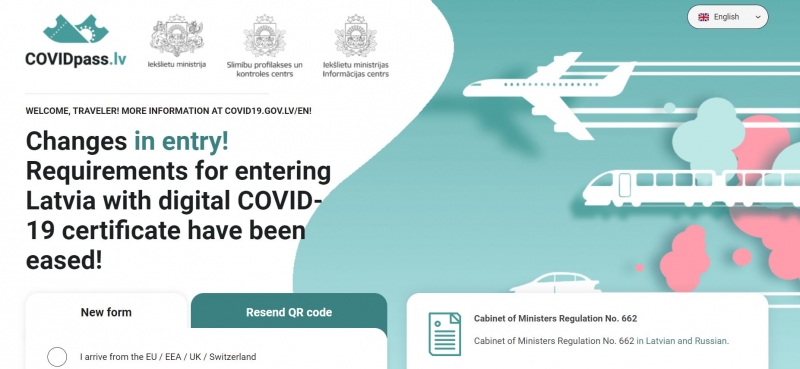
In accordance with the Cabinet of Ministers Regulation No. 662 “Epidemiological Safety Measures for the Containment of the Spread of Covid-19 Infection” , entry into Latvia from abroad has been facilitated for persons vaccinated against Covid-19, as well as persons who have contracted the disease, upon presentation of a valid digital Covid-19 certificate from most countries, except countries with particularly high risk*, may enter Latvia without the mandatory test and without self-isolation, but all persons intending to enter Latvia are still required to fill in an electronic arrival confirmation form on the Covidpass.lv website.
The form is mandatory for all travelers and must be completed no earlier than 48 hours before crossing the border of the Republic of Latvia.
After completing the confirmation form, the traveler will receive a personalized QR code confirming the submission of the data. The code is necessary for carriers, the Health Inspectorate, the State Police, local police, the State Border Guard and the Centre for Disease Prevention and Control to check that the restrictions are being respected.
The most important points about filling in the Covidpass arrival confirmation form
You must confirm your entry to the Republic of Latvia by ticking one of the following statuses on the confirmation form:
- whether or not the person has an interoperable digital COVID-19 certificate, recognized in the European Union, certifying completion of vaccination, the fact of having contracted the disease;
- the person may indicate the reason for entry if he/she falls under one of the exceptions mentioned in the Cabinet of Ministers Regulation No. 662 “Epidemiological Safety Measures for the Containment of the Spread of Covid-19 Infection” , which allows not to present the European digital COVID-19 certificate.
The form must contain the following personal data:
- name, surname;
- personal identification number or travel document number (passport or ID card);
- E-mail address;
- date of entry;
- other information required by the supervisory authorities (countries visited in recent days, contact details, address if necessary, vehicle number, etc.).
You must fill in the form each time for yourself, your children and persons under your guardianship. Each adult must complete the form separately; forms for minors must be filled in by the minors’ parents or legal guardians. Every 30 days, the form may be submitted to the persons referred to in Paragraph 151 of Cabinet Regulation No. 662 “ Epidemiological Safety Measures for the Containment of the Spread of Covid-19 Infection ”.
After completing the form, the person will receive a personalized QR code on the screen of the device and in their e-mail confirming the submission. If the form is filled in incorrectly, the confirmation form can be filled in again. In case the QR code is lost, the website has a function to “Receive the QR code” again by entering your e-mail address.
Personal data will be stored for 30 days for the purpose of using the information received for epidemiological safety and contact tracing.
If you have any questions about the use of Covidpass.lv , please contact the Service Desk of the Information Centre: phone +371 67219111 , e-mail: [email protected] .
Please also note that when you cross the border of the Republic of Latvia, you will be sent a reminder message about the completion of the Covidpass.lv arrival confirmation form, regardless of whether you have actually completed it. If you have already filled it in, you do not need to do it again after receiving the text message.
* Countries at particularly high risk are countries where an epidemiological situation has been identified that could pose a serious risk to public health, for more information see the Centre for Disease Prevention and Control website.
Additional information:
Information Centre of the Ministry of the Interior
Tel.: +371 67219111
E-mail: [email protected]
Website: www.covidpass.lv
Share this page content!

Accessible content
From june 16 the requirements for entering latvia from abroad will be eased.
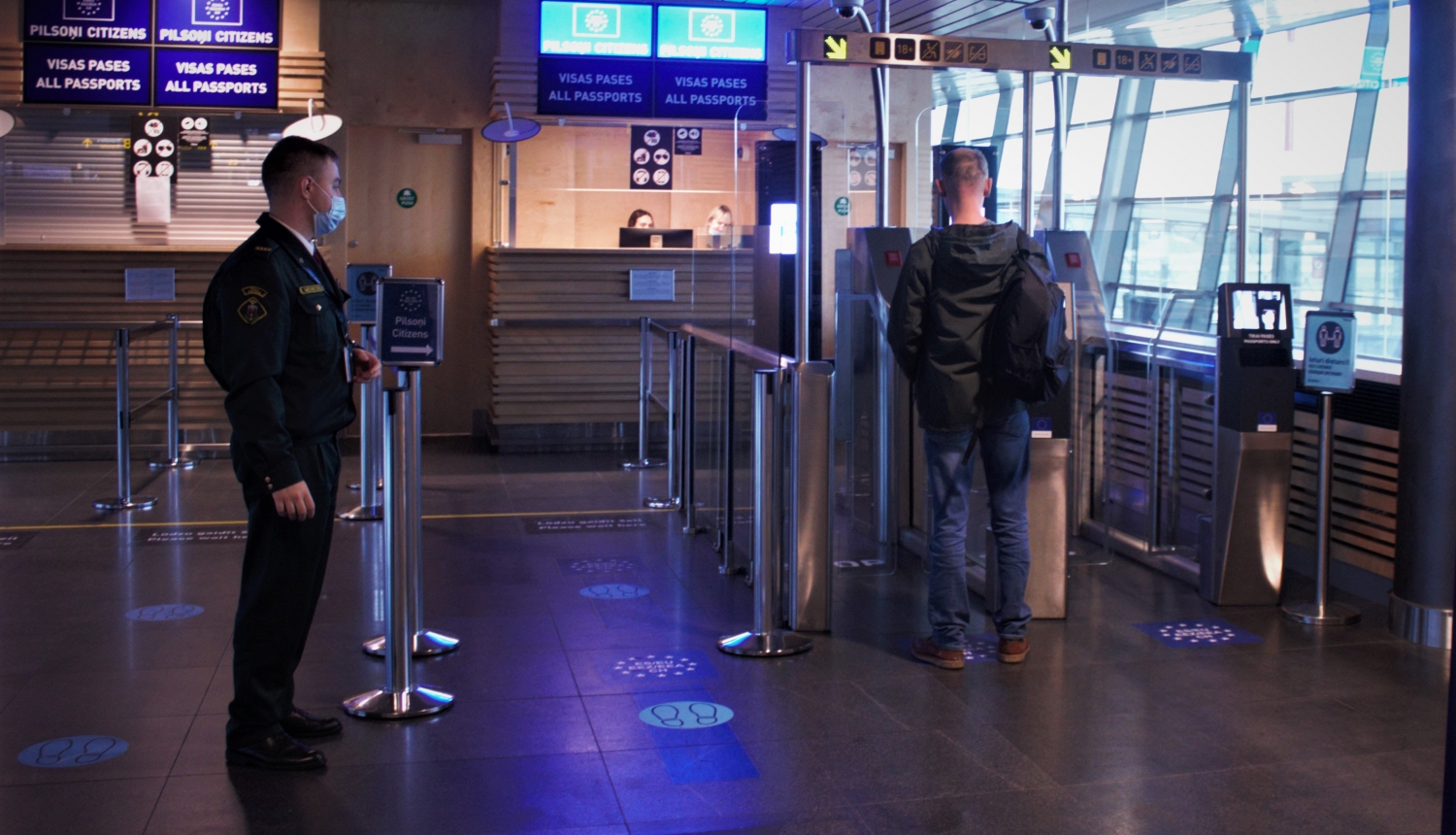
From Wednesday, June 16, the ban on non-essential travel, the requirement to pass the Covid-19 test and self-isolate when entering Latvia will be lifted if an individual can present a digital Covid-19 certificate confirming the completion of vaccination or recovery from the disease.
Today, June 15, the government approved the amendments to Cabinet Regulation No 360 “Epidemiological safety measures to limit the spread of Covid-19 infection” proposed by the Ministry of Transport, which revokes a number of requirements for entry into Latvia if an individual can prove by means of a digital certificate that he or she is vaccinated against Covid-19 or has recovered from the disease during the last six months.
With the increase in vaccination coverage and the decrease in the incidence of Covid-19, the Cabinet of Ministers has decided to revoke those epidemiological safety requirements that do not apply to fully vaccinated or recovered from COVID-19.
“I am pleased that travel requirements have been simplified and aligned with the recommendations of the Council of the European Union. Latvia’s decision to allow non-essential travel for vaccinated has been harmonised with the regulations of other EU Member States. The epidemiological situation in the European Union is improving, and this allows us to review the restrictions imposed so far. Coordinated and united action of the European Union for free travel will allow both citizens to plan summer vacations and the international passenger transport industry to return to business as usual,” explains Minister of Transport Tālis Linkaits.
For a transitional period until 1 September, one can present a document equal to digital certificate in English or in the language of the country of departure either on paper or electronically (on a smart device).
The amendments also stipulate that children under the age of 12 do not have to present a negative test result when entering Latvia, but they will be subject to the same conditions for self-isolation as their companions: if the person accompanying the child does not have to self-isolate, then the child also does not have to. However, for 10 days after entry, those children will not be allowed to contact people outside their household, attend public events, children’s groups, go to camp, school, or kindergarten, or use public transport.
In future, for a country to be considered epidemiologically safe, its cumulative incidence over the last 14 days must not exceed 75 cases per 100 000 population, instead of the current 50 cases.
The ban on non-essential travel to Latvia, the requirement to perform a test before and after the trip, as well as the requirement for self-isolation for vaccinated and recovered remain only when traveling from countries with a particularly high risk to public health (Emergency brake regulation).
Non-Covid-19 certified (non-vaccinated, non-recovered, without negative test result) individuals are allowed non-essential travel from the EU, EEA, Switzerland, the United Kingdom, and low-risk third countries, but non-vaccinated must be tested before travel and self-isolate upon arrival. When returning from high-risk third countries, those individuals must additionally undergo a test upon arrival in Latvia.
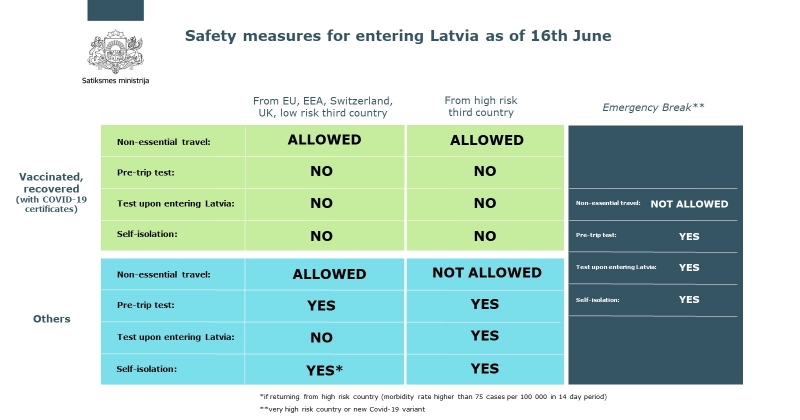
Prepered by:
Ministry of Transport
Share this page content!
From 1 April, the entry rules into Latvia have been reduced
Last update 28.03.2022
According to the government decision, the requirement to enter Latvia from the European Union (EU), European Economic Area countries, Switzerland and the United Kingdom with an interoperable Covid-19 vaccination or recovery certificate or a negative Covid-19 test result is lifted from 1 April. As the incidence of Covid-19 decreases, a number of existing epidemiological safety measures will be lifted from 1 April. Given that travel is not currently important in promoting the spread of Covid-19, the rules for entering Latvia will also change. For now, the current requirements to present an interoperable Covid-19 certificate or a negative Covid-19 test result remain in force on entry from third countries. It will also be possible to enter Latvia presenting the vaccination or recovery attestation issued in the United States, Australia, New Zealand or Canada. The Ministry of Health will continue to follow the experience of other EU countries in determining travel provisions, and as soon as the EU observes a tendency for countries to also waive the requesting of certificates from travellers from third countries, this experience will be adopted in Latvia. More information is available in Cabinet Regulation No. 662 “ Epidemiological Safety Measures for Containment of the Spread of Covid-19 Infection ”. Given that safety measures vary from country to country, we still encourage travellers to check the epidemiological safety requirements in the countries of destination and transit before the flight, clarifying the travel provisions and current requirements with the specific carrier.
Source reference
Satiksmes ministrija.

Accessible content
Entry into latvia, entry into latvia by citizens of russian federation, countries and territories whose citizens may enter latvia without a visa, legal framework on issuing visas, applying for a visa, documents required to apply for a visa, processing of visa applications and prior consultation, appeal against refusal, annulment and revocation of a visa and a local border traffic permit, entry into latvia by citizens of the union and their family members, share this page content.
- Skip to main content
- Skip to "About this site"
Language selection
Search travel.gc.ca.
Help us to improve our website. Take our survey !
COVID-19: travel health notice for all travellers
Latvia travel advice
Latest updates: The Health section was updated - travel health information (Public Health Agency of Canada)
Last updated: March 13, 2024 13:54 ET
On this page
Safety and security, entry and exit requirements, laws and culture, natural disasters and climate, latvia - take normal security precautions.
Take normal security precautions in Latvia
Back to top
Petty crime, such as pickpocketing and purse snatching, occurs in Riga, especially in the old part of town, in the market area and around the main railway station. Car theft is common.
- Ensure that your personal belongings, including your passport and other travel documents, are secure at all times
- Avoid showing signs of affluence and carrying large sums of cash
- Avoid walking alone after dark, especially in parks and poorly lit areas
- Never leave personal belongings unattended in a vehicle
- Use secure parking facilities, especially overnight
There is a threat of terrorism in Europe. Terrorist attacks have occurred in a number of European cities. There is a potential for other violent incidents.
Targets could include:
- government buildings, including schools
- places of worship
- airports and other transportation hubs and networks
- public areas such as tourist attractions, restaurants, bars, coffee shops, shopping centres, markets, hotels and other sites frequented by foreigners
Always be aware of your surroundings when in public places.
Credit card and ATM fraud is a concern. Strangers may invite you to visit local bars. This is often a ploy to overcharge customers for drinks. Discussions about overcharging may lead to threats of violence and security guards may force you to pay.
Be cautious when using debit or credit cards:
- pay careful attention when your cards are being handled by others
- use ATMs located in well-lit public areas or inside a bank or business
- avoid using card readers with an irregular or unusual feature
- cover the keypad with one hand when entering your PIN
- check for any unauthorized transactions on your account statements
Overseas fraud
Spiked food and drinks
Never leave food or drinks unattended or in the care of strangers. Be wary of accepting snacks, beverages, gum or cigarettes from new acquaintances, as these items may contain drugs that could put you at risk of sexual assault and robbery.
Demonstrations
Demonstrations may occur. Even peaceful demonstrations can turn violent at any time. They can also lead to disruptions to traffic and public transportation.
- Avoid areas where demonstrations and large gatherings are taking place
- Follow the instructions of local authorities
- Monitor local media for information on ongoing demonstrations
Mass gatherings (large-scale events)
Road safety
Road conditions and road safety can vary greatly throughout the country.
The highway system is generally good, but poor lighting poses risks to pedestrians, cyclists and motorists. Secondary roads may not be paved.
Driving conditions may be hazardous during winter since roads are not always cleared of snow. Beware of fog, snow and ice while driving.
Drivers are extremely aggressive and reckless.
Public transportation
Bus service is generally comfortable and reliable. Trains operate throughout the country.
Taxis are a reliable means of transportation. Use only officially marked taxis.
We do not make assessments on the compliance of foreign domestic airlines with international safety standards.
Information about foreign domestic airlines
Every country or territory decides who can enter or exit through its borders. The Government of Canada cannot intervene on your behalf if you do not meet your destination’s entry or exit requirements.
We have obtained the information on this page from the Latvian authorities. It can, however, change at any time.
Verify this information with the Foreign Representatives in Canada .
- Schengen area
Latvia is a Schengen area country. Canadian citizens do not need a visa for travel to countries within the Schengen area. However, visa-free travel only applies to stays of up to 90 days in any 180-day period. Stays are cumulative and include visits to any Schengen area country.
If you plan to stay in the Schengen area for a longer period of time, you will need a visa. You must contact the high commission or embassy of the country or countries you are travelling to and obtain the appropriate visa(s) prior to travel.
Useful links
- Foreign Representatives in Canada
Entry requirements vary depending on the type of passport you use for travel.
Before you travel, check with your transportation company about passport requirements. Its rules on passport validity may be more stringent than the country’s entry rules.
Regular Canadian passport
Your passport must be valid for at least 3 months beyond the date you expect to leave the Schengen area.
Passport for official travel
Different entry rules may apply.
Official travel
Passport with “X” gender identifier
While the Government of Canada issues passports with an “X” gender identifier, it cannot guarantee your entry or transit through other countries. You might face entry restrictions in countries that do not recognize the “X” gender identifier. Before you leave, check with the closest foreign representative for your destination.
Other travel documents
Different entry rules may apply when travelling with a temporary passport or an emergency travel document. Before you leave, check with the closest foreign representative for your destination.
- Foreign Representatives in Canada
- Canadian passports
Tourist visa: not required for stays up to 90 days* Business visa: not required for stays up to 14 days Student visa: not required for stays up to 90 days* Work permit: required
* The 90-day period begins upon initial entry into any country of the Schengen area. Stays are cumulative and include visits to any Schengen area country within any 180-day period.
Entry ban on vehicles registered in Russia
Latvia enforces an entry ban on vehicles registered in Russia. This restriction is currently in place at the border and reflects European Union sanctions against the Russian Federation.
Vehicles registered in Russia carrying Russian license plates will be refused entry into Latvia.
Restrictions on vehicles with Russian license plates are in place in countries bordering Latvia. Check with local authorities before you try to leave Latvia in a vehicle with Russian license plates.
Persons with vehicles registered in the Russian Federation are banned from Entering Latvia – State Revenue Service
Health insurance
When entering Latvia, you must be able to show sufficient proof of medical insurance to customs officials. The insurance must cover the entire length of your stay. If you do not have proof of insurance coverage, you may be required to obtain health insurance from a Latvian insurance company when you arrive.
Children and travel
Learn more about travelling with children .
Yellow fever
Learn about potential entry requirements related to yellow fever (vaccines section).
Relevant Travel Health Notices
- Global Measles Notice - 13 March, 2024
- COVID-19 and International Travel - 13 March, 2024
This section contains information on possible health risks and restrictions regularly found or ongoing in the destination. Follow this advice to lower your risk of becoming ill while travelling. Not all risks are listed below.
Consult a health care professional or visit a travel health clinic preferably 6 weeks before you travel to get personalized health advice and recommendations.
Routine vaccines
Be sure that your routine vaccinations , as per your province or territory , are up-to-date before travelling, regardless of your destination.
Some of these vaccinations include measles-mumps-rubella (MMR), diphtheria, tetanus, pertussis, polio, varicella (chickenpox), influenza and others.
Pre-travel vaccines and medications
You may be at risk for preventable diseases while travelling in this destination. Talk to a travel health professional about which medications or vaccines may be right for you, based on your destination and itinerary.
Yellow fever is a disease caused by a flavivirus from the bite of an infected mosquito.
Travellers get vaccinated either because it is required to enter a country or because it is recommended for their protection.
- There is no risk of yellow fever in this country.
Country Entry Requirement*
- Proof of vaccination is not required to enter this country.
Recommendation
- Vaccination is not recommended.
* It is important to note that country entry requirements may not reflect your risk of yellow fever at your destination. It is recommended that you contact the nearest diplomatic or consular office of the destination(s) you will be visiting to verify any additional entry requirements.
About Yellow Fever
Yellow Fever Vaccination Centres in Canada
There is a risk of hepatitis A in this destination. It is a disease of the liver. People can get hepatitis A if they ingest contaminated food or water, eat foods prepared by an infectious person, or if they have close physical contact (such as oral-anal sex) with an infectious person, although casual contact among people does not spread the virus.
Practise safe food and water precautions and wash your hands often. Vaccination is recommended for all travellers to areas where hepatitis A is present.
Tick-borne encephalitis (TBE) is a risk in some areas of this destination. It is a viral disease that affects the central nervous system (brain and spinal cord). It is spread to humans by the bite of infected ticks or occasionally when unpasteurized milk products are consumed.
Travellers to areas where TBE is found may be at higher risk during April to November, and the risk is highest for people who hike or camp in forested areas.
Protect yourself from tick bites . The vaccine is not available in Canada. It may be available in the destination you are travelling to.
Measles is a highly contagious viral disease. It can spread quickly from person to person by direct contact and through droplets in the air.
Anyone who is not protected against measles is at risk of being infected with it when travelling internationally.
Regardless of where you are going, talk to a health care professional before travelling to make sure you are fully protected against measles.
Hepatitis B is a risk in every destination. It is a viral liver disease that is easily transmitted from one person to another through exposure to blood and body fluids containing the hepatitis B virus. Travellers who may be exposed to blood or other bodily fluids (e.g., through sexual contact, medical treatment, sharing needles, tattooing, acupuncture or occupational exposure) are at higher risk of getting hepatitis B.
Hepatitis B vaccination is recommended for all travellers. Prevent hepatitis B infection by practicing safe sex, only using new and sterile drug equipment, and only getting tattoos and piercings in settings that follow public health regulations and standards.
Coronavirus disease (COVID-19) is an infectious viral disease. It can spread from person to person by direct contact and through droplets in the air.
It is recommended that all eligible travellers complete a COVID-19 vaccine series along with any additional recommended doses in Canada before travelling. Evidence shows that vaccines are very effective at preventing severe illness, hospitalization and death from COVID-19. While vaccination provides better protection against serious illness, you may still be at risk of infection from the virus that causes COVID-19. Anyone who has not completed a vaccine series is at increased risk of being infected with the virus that causes COVID-19 and is at greater risk for severe disease when travelling internationally.
Before travelling, verify your destination’s COVID-19 vaccination entry/exit requirements. Regardless of where you are going, talk to a health care professional before travelling to make sure you are adequately protected against COVID-19.
The best way to protect yourself from seasonal influenza (flu) is to get vaccinated every year. Get the flu shot at least 2 weeks before travelling.
The flu occurs worldwide.
- In the Northern Hemisphere, the flu season usually runs from November to April.
- In the Southern Hemisphere, the flu season usually runs between April and October.
- In the tropics, there is flu activity year round.
The flu vaccine available in one hemisphere may only offer partial protection against the flu in the other hemisphere.
The flu virus spreads from person to person when they cough or sneeze or by touching objects and surfaces that have been contaminated with the virus. Clean your hands often and wear a mask if you have a fever or respiratory symptoms.
In this destination, rabies may be present in some wildlife species, including bats. Rabies is a deadly disease that spreads to humans primarily through bites or scratches from an infected animal.
If you are bitten or scratched by an animal while travelling, immediately wash the wound with soap and clean water and see a health care professional.
Before travel, discuss rabies vaccination with a health care professional. It may be recommended for travellers who will be working directly with wildlife.
Safe food and water precautions
Many illnesses can be caused by eating food or drinking beverages contaminated by bacteria, parasites, toxins, or viruses, or by swimming or bathing in contaminated water.
- Learn more about food and water precautions to take to avoid getting sick by visiting our eat and drink safely abroad page. Remember: Boil it, cook it, peel it, or leave it!
- Avoid getting water into your eyes, mouth or nose when swimming or participating in activities in freshwater (streams, canals, lakes), particularly after flooding or heavy rain. Water may look clean but could still be polluted or contaminated.
- Avoid inhaling or swallowing water while bathing, showering, or swimming in pools or hot tubs.
Insect bite prevention
Many diseases are spread by the bites of infected insects such as mosquitoes, ticks, fleas or flies. When travelling to areas where infected insects may be present:
- Use insect repellent (bug spray) on exposed skin
- Cover up with light-coloured, loose clothes made of tightly woven materials such as nylon or polyester
- Minimize exposure to insects
- Use mosquito netting when sleeping outdoors or in buildings that are not fully enclosed
To learn more about how you can reduce your risk of infection and disease caused by bites, both at home and abroad, visit our insect bite prevention page.
Find out what types of insects are present where you’re travelling, when they’re most active, and the symptoms of the diseases they spread.
Animal precautions
Some infections, such as rabies and influenza, can be shared between humans and animals. Certain types of activities may increase your chance of contact with animals, such as travelling in rural or forested areas, camping, hiking, and visiting wet markets (places where live animals are slaughtered and sold) or caves.
Travellers are cautioned to avoid contact with animals, including dogs, livestock (pigs, cows), monkeys, snakes, rodents, birds, and bats, and to avoid eating undercooked wild game.
Closely supervise children, as they are more likely to come in contact with animals.
Person-to-person infections
Stay home if you’re sick and practise proper cough and sneeze etiquette , which includes coughing or sneezing into a tissue or the bend of your arm, not your hand. Reduce your risk of colds, the flu and other illnesses by:
- washing your hands often
- avoiding or limiting the amount of time spent in closed spaces, crowded places, or at large-scale events (concerts, sporting events, rallies)
- avoiding close physical contact with people who may be showing symptoms of illness
Sexually transmitted infections (STIs) , HIV , and mpox are spread through blood and bodily fluids; use condoms, practise safe sex, and limit your number of sexual partners. Check with your local public health authority pre-travel to determine your eligibility for mpox vaccine.
Tuberculosis is an infection caused by bacteria and usually affects the lungs.
For most travellers the risk of tuberculosis is low.
Travellers who may be at high risk while travelling in regions with risk of tuberculosis should discuss pre- and post-travel options with a health care professional.
High-risk travellers include those visiting or working in prisons, refugee camps, homeless shelters, or hospitals, or travellers visiting friends and relatives.
Medical services and facilities
Good health care is only available in major cities. Quality of care varies greatly throughout the country.
Doctors and hospitals often expect immediate payment for health services.
Make sure you get travel insurance that includes coverage for medical evacuation and hospital stays.
Travel health and safety
Keep in Mind...
The decision to travel is the sole responsibility of the traveller. The traveller is also responsible for his or her own personal safety.
Be prepared. Do not expect medical services to be the same as in Canada. Pack a travel health kit , especially if you will be travelling away from major city centres.
You must abide by local laws.
Learn about what you should do and how we can help if you are arrested or detained abroad .
Transfer to a Canadian prison
Canada and Latvia are signatories to the Convention on the Transfer of Sentenced Persons. This enables a Canadian imprisoned in Latvia to request a transfer to a Canadian prison to complete a sentence. The transfer requires the agreement of both Canadian and Latvia authorities.
This process can take a long time, and there is no guarantee that the transfer will be approved by either or both sides.
Convention on the Transfer of Sentenced Persons
Canada and Latvia are signatories to the Convention on the Transfer of Sentenced Persons. This enables a Canadian imprisoned in Latvia to request a transfer to a Canadian prison to complete a sentence. The transfer requires the agreement of both Canadian and Latvian authorities.
Penalties for possession, use or trafficking of illegal drugs are severe. Convicted offenders can expect prison sentences or heavy fines.
Drinking alcohol in public could lead to detention and a fine.
Drugs, alcohol and travel
Dual citizenship
Dual citizenship is legally recognized in Latvia.
If you are a Canadian citizen, but also a citizen of Latvia, our ability to offer you consular services may be limited while you're there. You may also be subject to different entry/exit requirements .
Travellers with dual citizenship
International Child Abduction
The Hague Convention on the Civil Aspects of International Child Abduction is an international treaty. It can help parents with the return of children who have been removed to or retained in certain countries in violation of custody rights. The convention applies between Canada and Latvia.
If your child was wrongfully taken to, or is being held in Latvia, and if the applicable conditions are met, you may apply for the return of your child to the Latvian court.
If you are in this situation:
- act as quickly as you can
- contact the Central Authority for your province or territory of residence for information on starting an application under The Hague Convention
- consult a lawyer in Canada and in Latvia to explore all the legal options for the return of your child
- report the situation to the nearest Canadian government office abroad or to the Vulnerable Children’s Consular Unit at Global Affairs Canada by calling the Emergency Watch and Response Centre
If your child was removed from a country other than Canada, consult a lawyer to determine if The Hague Convention applies.
Be aware that Canadian consular officials cannot interfere in private legal matters or in another country’s judicial affairs.
- List of Canadian Central Authorities for the Hague Convention
- International Child Abduction: A Guidebook for Left-Behind Parents
- Travelling with children
- The Hague Convention - Hague Conference on Private International Law
- Canadian embassies and consulates by destination
- Emergency Watch and Response Centre
Export of religious items and antiquities
Strict regulations are in place on exporting religious items or antiquities. If you purchase or acquire any such item while in Latvia, confirm with local authorities if you may export such items with you before attempting to leave.
You can drive in Latvia with your valid Canadian driver’s licence for one year.
However, you should carry an international driving permit.
Penalties for drinking and driving are severe. The legal blood alcohol limit is 0.02 percent for drivers with less than two years of driving experience and 0.05 percent for others. If a police officer suspects you of drinking and driving, they could confiscate your driver's licence on the spot. If you’re convicted, you can expect heavy fines or jail sentences.
If you are involved in an accident, do not move the vehicles until authorized to do so by the police.
All vehicles must have a first-aid kit and emergency travel equipment.
- Driving in Latvia - European Commission
- More about the International Driving Permit
Pedestrians
Pedestrians are required to wear small reflectors from dusk until dawn. These are usually pinned to coats or bags. This is particularly important in rural areas, where lack of lighting makes it difficult for drivers to see pedestrians.
When using public transportation, tickets must be validated at the start of any trip. You could be fined on the spot if you fail to show a validated ticket to an official upon request.
Vehicles with Russian license plates
All vehicles with Russian license plates currently in Latvia must be registered with the Latvian authorities before February 14, 2024. After that date, any vehicle with a Russian license plate will be confiscated by the authorities.
The currency of Latvia is the Euro (EUR).
If you are carrying €10,000 or more, or the equivalent in other currencies, you must make a declaration to customs when you enter or leave the European Union. It includes sums in:
- banknotes and coins
- bearer negotiable instruments such as cheques, travellers’ cheques, promissory notes and money orders
- bonds, shares
- gold coins with a gold content of at least 90 %
- gold bars, nuggets or clumps with a gold content of at least 99.5 %
- any other convertible asset
This does not apply if you are travelling within the European Union or in transit to a non-EU country.
EU cash controls - European Commission
Winter weather can be severe due to heavy snowfall and extremely cold temperatures.
Flooding may occur in spring.
These conditions can put you at risk and hamper the provision of essential services. If you decide to travel to Latvia during these periods:
- be prepared to change your travel plans on short notice, including cutting short or cancelling your trip
- stay informed of the latest regional weather forecasts
- carry emergency contact information for your airline or tour operator
- follow the advice and instructions of local authorities
Local services
Dial 112 for emergency assistance.
Touristic Police in Riga
If you need help, dial +371 6718 1818 for assistance, available in English, 24 hours a day, seven days a week.
Tourist inquiry hotline
If you’re looking for advice or want to express a grievance, dial 1188. Assistance is available in English.
Consular assistance
For emergency consular assistance, call the embassy of Canada in Latvia, in Riga, and follow the instructions. At any time, you may also contact the Emergency Watch and Response Centre in Ottawa.
The decision to travel is your choice and you are responsible for your personal safety abroad. We take the safety and security of Canadians abroad very seriously and provide credible and timely information in our Travel Advice to enable you to make well-informed decisions regarding your travel abroad.
The content on this page is provided for information only. While we make every effort to give you correct information, it is provided on an "as is" basis without warranty of any kind, expressed or implied. The Government of Canada does not assume responsibility and will not be liable for any damages in connection to the information provided.
If you need consular assistance while abroad, we will make every effort to help you. However, there may be constraints that will limit the ability of the Government of Canada to provide services.
Learn more about consular services .
Risk Levels
take normal security precautions.
Take similar precautions to those you would take in Canada.
Exercise a high degree of caution
There are certain safety and security concerns or the situation could change quickly. Be very cautious at all times, monitor local media and follow the instructions of local authorities.
IMPORTANT: The two levels below are official Government of Canada Travel Advisories and are issued when the safety and security of Canadians travelling or living in the country or region may be at risk.
Avoid non-essential travel
Your safety and security could be at risk. You should think about your need to travel to this country, territory or region based on family or business requirements, knowledge of or familiarity with the region, and other factors. If you are already there, think about whether you really need to be there. If you do not need to be there, you should think about leaving.
Avoid all travel
You should not travel to this country, territory or region. Your personal safety and security are at great risk. If you are already there, you should think about leaving if it is safe to do so.
- Consular Information
- Bilateral relations
- InvestinLatvia2013
- Email this link
- Search result
- About Latvia

Entry into Latvia
The diplomatic missions and consular posts of the Republic of Latvia accept visa applications from the citizens of the Russian Federation in following cases:
- family members (spouse, grandparents, parents, children, grandchildren, and dependent persons) of a national of the Republic of Latvia;
- family members of the nationals of the European Union, the European Economic Area, or the Swiss Confederation (under Cabinet Regulation No. 675 of 30 August 2011, “Procedures for the Entry and Residence in the Republic of Latvia of Citizens of the Union and their Family Members” );
- persons who have received the right of residence in Latvia;
- persons whose entry is related to humanitarian considerations (a serious illness of a relative or the need to attend a funeral, or there are threats to their or their family member's safety or life).
Each visa application is assessed in detail on a case by case basis to obtain proof that the person falls within any of the above listed categories. Where the purpose of entry is related to humanitarian considerations, the visa applicant must present documents confirming the purpose of entry and kinship.
All travellers are responsible for verifying travel restrictions in place before departure. Holders of a Schengen visa are not automatically entitled to enter the Schengen area but must respect the travel restrictions in place.
Please note that starting from 1 January 2021, holders of the UK residence documents will not be exempted from the visa requirement in order to travel to Latvia.
Citizens of third countries who are residents of the United Kingdom and would like to travel to Latvia can apply for Schengen visa at the Embassy of Latvia in London. The Embassy of Latvia has appointed VF Services (UK) Limited in London, Manchester and Edinburgh to provide document collection and submission service for Schengen visa applicants traveling to Latvia. Visa applications are to be submitted in the visa application centres, from where they will be sent to the Embassy of Latvia in London for their further assessment. Additional information is available here: Apply for VISA to Latvia.
Visa applications can be submitted no more than six months before the intended visit and no later than 15 calendar days before the start of the intended visit.
Appointments for Schengen visa applicants can be scheduled at The Joint Visa Application Centres for the Latvia .
SCHEDULE AN APPOINTMENT FOR SCHENGEN VISA
IMPORTANT: All visa applicants aged 12 years and older must apply for Schengen visa in person in order to have fingerprints taken.
The service focuses on delivering visas within a short period of time (10 days calculated from the date that the Embassy receives the application) . Please note that all applications are processed individually. The Visa Officer may request further documentation or information, which can prolong the processing time. In certain cases it may take up to 45 days when additional documents are requested or an interview at the Embassy is scheduled.
For the following nationals the visa processing time takes a minimum of 10 working days .
All fees paid for processing a visa application are non-refundable. Any documents submitted (except for the passport) are not a matter of return after the application is made.
- If you want to visit Latvia , please apply for a visa at the Embassy of Latvia. If you want to visit other Schengen country , apply for a visa at the Embassy or Consulate of that country.
- If you want to visit several Schengen countries, or if several separate visits are to be carried out within a period of two months, apply at the Embassy or Consulate of the country of your main destination or the country where you intend to stay for the longest period of time.
- If you intend to visit several Schengen countries, but do not have the main destination, you should apply at the Embassy or Consulate of the Schengen country of your first entry .
Holders of the following types of UK travel documents are required to apply for a Schengen visa in order to travel to Latvia:
- A stateless persons travel document, being red coloured (Convention of 28 September 1954);
- A certificate of travel, also called a certificate of identity, being either brown or black coloured. LTD visa;
- A convention travel document, being blue coloured (convention of 28 July 1951).
Emergencies
In an emergency, such as the death or serious illness of a relative, please contact the Embassy for further information. When you travel to Latvia, the Schengen visa should be in your valid passport. Old passport with a valid Schengen visa can be used for travel if a new passport has been issued because there were not sufficiently many free pages for visas and notes on border-crossing in the previous passport. Holders of Schengen visa are still subject to immigration controls and are not guaranteed entry into any of the Schengen countries.
Documents required when applying for a short-stay visa to enter Latvia
Information for UK nationals
Airport Transit Visa
Visa application fees at the Embassy of Latvia in the UK
Residence Permits
Privacy policy for the processing of personal data during the acceptance and examination of visa applications, and ensuring the appeal of the decisions taken
Embassy of the Republic of Latvia in the United Kingdom of Great Britain and northern Ireland
Subscribe to news letter
You are using an outdated browser. Upgrade your browser today or install Google Chrome Frame to better experience this site.
Latvia Traveler View
Travel health notices, vaccines and medicines, non-vaccine-preventable diseases, stay healthy and safe.
- Packing List
After Your Trip
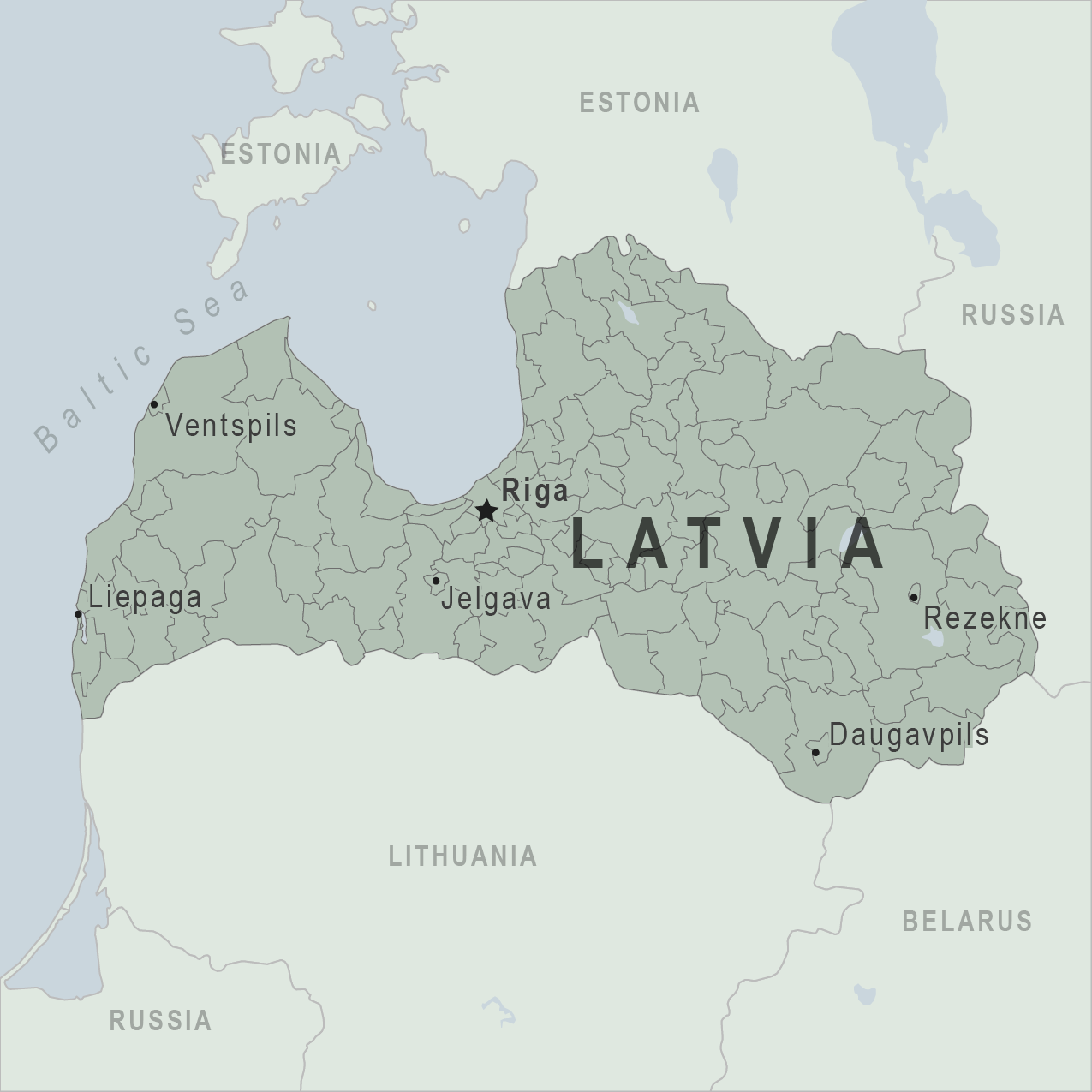
There are no notices currently in effect for Latvia.
⇧ Top
Check the vaccines and medicines list and visit your doctor at least a month before your trip to get vaccines or medicines you may need. If you or your doctor need help finding a location that provides certain vaccines or medicines, visit the Find a Clinic page.
Routine vaccines
Recommendations.
Make sure you are up-to-date on all routine vaccines before every trip. Some of these vaccines include
- Chickenpox (Varicella)
- Diphtheria-Tetanus-Pertussis
- Flu (influenza)
- Measles-Mumps-Rubella (MMR)
Immunization schedules
All eligible travelers should be up to date with their COVID-19 vaccines. Please see Your COVID-19 Vaccination for more information.
COVID-19 vaccine
Hepatitis A
Recommended for unvaccinated travelers one year old or older going to Latvia.
Infants 6 to 11 months old should also be vaccinated against Hepatitis A. The dose does not count toward the routine 2-dose series.
Travelers allergic to a vaccine component or who are younger than 6 months should receive a single dose of immune globulin, which provides effective protection for up to 2 months depending on dosage given.
Unvaccinated travelers who are over 40 years old, immunocompromised, or have chronic medical conditions planning to depart to a risk area in less than 2 weeks should get the initial dose of vaccine and at the same appointment receive immune globulin.
Hepatitis A - CDC Yellow Book
Dosing info - Hep A
Hepatitis B
Recommended for unvaccinated travelers of all ages traveling to Latvia.
Hepatitis B - CDC Yellow Book
Dosing info - Hep B
Cases of measles are on the rise worldwide. Travelers are at risk of measles if they have not been fully vaccinated at least two weeks prior to departure, or have not had measles in the past, and travel internationally to areas where measles is spreading.
All international travelers should be fully vaccinated against measles with the measles-mumps-rubella (MMR) vaccine, including an early dose for infants 6–11 months, according to CDC’s measles vaccination recommendations for international travel .
Measles (Rubeola) - CDC Yellow Book
Latvia is free of dog rabies. However, rabies may still be present in wildlife species, particularly bats. CDC recommends rabies vaccination before travel only for people working directly with wildlife. These people may include veterinarians, animal handlers, field biologists, or laboratory workers working with specimens from mammalian species.
Rabies - CDC Yellow Book
Tick-borne Encephalitis
For travelers moving or traveling to TBE-endemic areas
TBE vaccine is recommended for persons who will have extensive exposure to ticks based on their planned outdoor activities and itinerary.
TBE vaccine may be considered for persons who might engage in outdoor activities in areas ticks are likely to be found.
Tick-borne Encephalitis - CDC Yellow Book
Avoid contaminated water
Leptospirosis
How most people get sick (most common modes of transmission)
- Touching urine or other body fluids from an animal infected with leptospirosis
- Swimming or wading in urine-contaminated fresh water, or contact with urine-contaminated mud
- Drinking water or eating food contaminated with animal urine
- Avoid contaminated water and soil
Clinical Guidance
Airborne & droplet.
- Breathing in air or accidentally eating food contaminated with the urine, droppings, or saliva of infected rodents
- Bite from an infected rodent
- Less commonly, being around someone sick with hantavirus (only occurs with Andes virus)
- Avoid rodents and areas where they live
- Avoid sick people
Tuberculosis (TB)
- Breathe in TB bacteria that is in the air from an infected and contagious person coughing, speaking, or singing.
Learn actions you can take to stay healthy and safe on your trip. Vaccines cannot protect you from many diseases in Latvia, so your behaviors are important.
Eat and drink safely
Food and water standards around the world vary based on the destination. Standards may also differ within a country and risk may change depending on activity type (e.g., hiking versus business trip). You can learn more about safe food and drink choices when traveling by accessing the resources below.
- Choose Safe Food and Drinks When Traveling
- Water Treatment Options When Hiking, Camping or Traveling
- Global Water, Sanitation and Hygiene | Healthy Water
- Avoid Contaminated Water During Travel
You can also visit the Department of State Country Information Pages for additional information about food and water safety.
Prevent bug bites
Bugs (like mosquitoes, ticks, and fleas) can spread a number of diseases in Latvia. Many of these diseases cannot be prevented with a vaccine or medicine. You can reduce your risk by taking steps to prevent bug bites.
What can I do to prevent bug bites?
- Cover exposed skin by wearing long-sleeved shirts, long pants, and hats.
- Use an appropriate insect repellent (see below).
- Use permethrin-treated clothing and gear (such as boots, pants, socks, and tents). Do not use permethrin directly on skin.
- Stay and sleep in air-conditioned or screened rooms.
- Use a bed net if the area where you are sleeping is exposed to the outdoors.
What type of insect repellent should I use?
- FOR PROTECTION AGAINST TICKS AND MOSQUITOES: Use a repellent that contains 20% or more DEET for protection that lasts up to several hours.
- Picaridin (also known as KBR 3023, Bayrepel, and icaridin)
- Oil of lemon eucalyptus (OLE) or para-menthane-diol (PMD)
- 2-undecanone
- Always use insect repellent as directed.
What should I do if I am bitten by bugs?
- Avoid scratching bug bites, and apply hydrocortisone cream or calamine lotion to reduce the itching.
- Check your entire body for ticks after outdoor activity. Be sure to remove ticks properly.
What can I do to avoid bed bugs?
Although bed bugs do not carry disease, they are an annoyance. See our information page about avoiding bug bites for some easy tips to avoid them. For more information on bed bugs, see Bed Bugs .
For more detailed information on avoiding bug bites, see Avoid Bug Bites .

Stay safe outdoors
If your travel plans in Latvia include outdoor activities, take these steps to stay safe and healthy during your trip.
- Stay alert to changing weather conditions and adjust your plans if conditions become unsafe.
- Prepare for activities by wearing the right clothes and packing protective items, such as bug spray, sunscreen, and a basic first aid kit.
- Consider learning basic first aid and CPR before travel. Bring a travel health kit with items appropriate for your activities.
- If you are outside for many hours in heat, eat salty snacks and drink water to stay hydrated and replace salt lost through sweating.
- Protect yourself from UV radiation : use sunscreen with an SPF of at least 15, wear protective clothing, and seek shade during the hottest time of day (10 a.m.–4 p.m.).
- Be especially careful during summer months and at high elevation. Because sunlight reflects off snow, sand, and water, sun exposure may be increased during activities like skiing, swimming, and sailing.
- Very cold temperatures can be dangerous. Dress in layers and cover heads, hands, and feet properly if you are visiting a cold location.
Stay safe around water
- Swim only in designated swimming areas. Obey lifeguards and warning flags on beaches.
- Practice safe boating—follow all boating safety laws, do not drink alcohol if driving a boat, and always wear a life jacket.
- Do not dive into shallow water.
- Do not swim in freshwater in developing areas or where sanitation is poor.
- Avoid swallowing water when swimming. Untreated water can carry germs that make you sick.
- To prevent infections, wear shoes on beaches where there may be animal waste.
Keep away from animals
Most animals avoid people, but they may attack if they feel threatened, are protecting their young or territory, or if they are injured or ill. Animal bites and scratches can lead to serious diseases such as rabies.
Follow these tips to protect yourself:
- Do not touch or feed any animals you do not know.
- Do not allow animals to lick open wounds, and do not get animal saliva in your eyes or mouth.
- Avoid rodents and their urine and feces.
- Traveling pets should be supervised closely and not allowed to come in contact with local animals.
- If you wake in a room with a bat, seek medical care immediately. Bat bites may be hard to see.
All animals can pose a threat, but be extra careful around dogs, bats, monkeys, sea animals such as jellyfish, and snakes. If you are bitten or scratched by an animal, immediately:
- Wash the wound with soap and clean water.
- Go to a doctor right away.
- Tell your doctor about your injury when you get back to the United States.
Consider buying medical evacuation insurance. Rabies is a deadly disease that must be treated quickly, and treatment may not be available in some countries.
Reduce your exposure to germs
Follow these tips to avoid getting sick or spreading illness to others while traveling:
- Wash your hands often, especially before eating.
- If soap and water aren’t available, clean hands with hand sanitizer (containing at least 60% alcohol).
- Don’t touch your eyes, nose, or mouth. If you need to touch your face, make sure your hands are clean.
- Cover your mouth and nose with a tissue or your sleeve (not your hands) when coughing or sneezing.
- Try to avoid contact with people who are sick.
- If you are sick, stay home or in your hotel room, unless you need medical care.
Avoid sharing body fluids
Diseases can be spread through body fluids, such as saliva, blood, vomit, and semen.
Protect yourself:
- Use latex condoms correctly.
- Do not inject drugs.
- Limit alcohol consumption. People take more risks when intoxicated.
- Do not share needles or any devices that can break the skin. That includes needles for tattoos, piercings, and acupuncture.
- If you receive medical or dental care, make sure the equipment is disinfected or sanitized.
Know how to get medical care while traveling
Plan for how you will get health care during your trip, should the need arise:
- Carry a list of local doctors and hospitals at your destination.
- Review your health insurance plan to determine what medical services it would cover during your trip. Consider purchasing travel health and medical evacuation insurance.
- Carry a card that identifies, in the local language, your blood type, chronic conditions or serious allergies, and the generic names of any medications you take.
- Some prescription drugs may be illegal in other countries. Call Latvia’s embassy to verify that all of your prescription(s) are legal to bring with you.
- Bring all the medicines (including over-the-counter medicines) you think you might need during your trip, including extra in case of travel delays. Ask your doctor to help you get prescriptions filled early if you need to.
Many foreign hospitals and clinics are accredited by the Joint Commission International. A list of accredited facilities is available at their website ( www.jointcommissioninternational.org ).
In some countries, medicine (prescription and over-the-counter) may be substandard or counterfeit. Bring the medicines you will need from the United States to avoid having to buy them at your destination.
Select safe transportation
Motor vehicle crashes are the #1 killer of healthy US citizens in foreign countries.
In many places cars, buses, large trucks, rickshaws, bikes, people on foot, and even animals share the same lanes of traffic, increasing the risk for crashes.
Be smart when you are traveling on foot.
- Use sidewalks and marked crosswalks.
- Pay attention to the traffic around you, especially in crowded areas.
- Remember, people on foot do not always have the right of way in other countries.
Riding/Driving
Choose a safe vehicle.
- Choose official taxis or public transportation, such as trains and buses.
- Ride only in cars that have seatbelts.
- Avoid overcrowded, overloaded, top-heavy buses and minivans.
- Avoid riding on motorcycles or motorbikes, especially motorbike taxis. (Many crashes are caused by inexperienced motorbike drivers.)
- Choose newer vehicles—they may have more safety features, such as airbags, and be more reliable.
- Choose larger vehicles, which may provide more protection in crashes.
Think about the driver.
- Do not drive after drinking alcohol or ride with someone who has been drinking.
- Consider hiring a licensed, trained driver familiar with the area.
- Arrange payment before departing.
Follow basic safety tips.
- Wear a seatbelt at all times.
- Sit in the back seat of cars and taxis.
- When on motorbikes or bicycles, always wear a helmet. (Bring a helmet from home, if needed.)
- Avoid driving at night; street lighting in certain parts of Latvia may be poor.
- Do not use a cell phone or text while driving (illegal in many countries).
- Travel during daylight hours only, especially in rural areas.
- If you choose to drive a vehicle in Latvia, learn the local traffic laws and have the proper paperwork.
- Get any driving permits and insurance you may need. Get an International Driving Permit (IDP). Carry the IDP and a US-issued driver's license at all times.
- Check with your auto insurance policy's international coverage, and get more coverage if needed. Make sure you have liability insurance.
- Avoid using local, unscheduled aircraft.
- If possible, fly on larger planes (more than 30 seats); larger airplanes are more likely to have regular safety inspections.
- Try to schedule flights during daylight hours and in good weather.
Medical Evacuation Insurance
If you are seriously injured, emergency care may not be available or may not meet US standards. Trauma care centers are uncommon outside urban areas. Having medical evacuation insurance can be helpful for these reasons.
Helpful Resources
Road Safety Overseas (Information from the US Department of State): Includes tips on driving in other countries, International Driving Permits, auto insurance, and other resources.
The Association for International Road Travel has country-specific Road Travel Reports available for most countries for a minimal fee.
Maintain personal security
Use the same common sense traveling overseas that you would at home, and always stay alert and aware of your surroundings.
Before you leave
- Research your destination(s), including local laws, customs, and culture.
- Monitor travel advisories and alerts and read travel tips from the US Department of State.
- Enroll in the Smart Traveler Enrollment Program (STEP) .
- Leave a copy of your itinerary, contact information, credit cards, and passport with someone at home.
- Pack as light as possible, and leave at home any item you could not replace.
While at your destination(s)
- Carry contact information for the nearest US embassy or consulate .
- Carry a photocopy of your passport and entry stamp; leave the actual passport securely in your hotel.
- Follow all local laws and social customs.
- Do not wear expensive clothing or jewelry.
- Always keep hotel doors locked, and store valuables in secure areas.
- If possible, choose hotel rooms between the 2nd and 6th floors.
Healthy Travel Packing List
Use the Healthy Travel Packing List for Latvia for a list of health-related items to consider packing for your trip. Talk to your doctor about which items are most important for you.
Why does CDC recommend packing these health-related items?
It’s best to be prepared to prevent and treat common illnesses and injuries. Some supplies and medicines may be difficult to find at your destination, may have different names, or may have different ingredients than what you normally use.
If you are not feeling well after your trip, you may need to see a doctor. If you need help finding a travel medicine specialist, see Find a Clinic . Be sure to tell your doctor about your travel, including where you went and what you did on your trip. Also tell your doctor if you were bitten or scratched by an animal while traveling.
For more information on what to do if you are sick after your trip, see Getting Sick after Travel .
Map Disclaimer - The boundaries and names shown and the designations used on maps do not imply the expression of any opinion whatsoever on the part of the Centers for Disease Control and Prevention concerning the legal status of any country, territory, city or area or of its authorities, or concerning the delimitation of its frontiers or boundaries. Approximate border lines for which there may not yet be full agreement are generally marked.
Other Destinations
If you need help finding travel information:
Message & data rates may apply. CDC Privacy Policy
File Formats Help:
- Adobe PDF file
- Microsoft PowerPoint file
- Microsoft Word file
- Microsoft Excel file
- Audio/Video file
- Apple Quicktime file
- RealPlayer file
- Zip Archive file
Exit Notification / Disclaimer Policy
- The Centers for Disease Control and Prevention (CDC) cannot attest to the accuracy of a non-federal website.
- Linking to a non-federal website does not constitute an endorsement by CDC or any of its employees of the sponsors or the information and products presented on the website.
- You will be subject to the destination website's privacy policy when you follow the link.
- CDC is not responsible for Section 508 compliance (accessibility) on other federal or private website.

Search Smartraveller

Latest update
Exercise normal safety precautions overall in Latvia.
Higher levels apply in some areas.
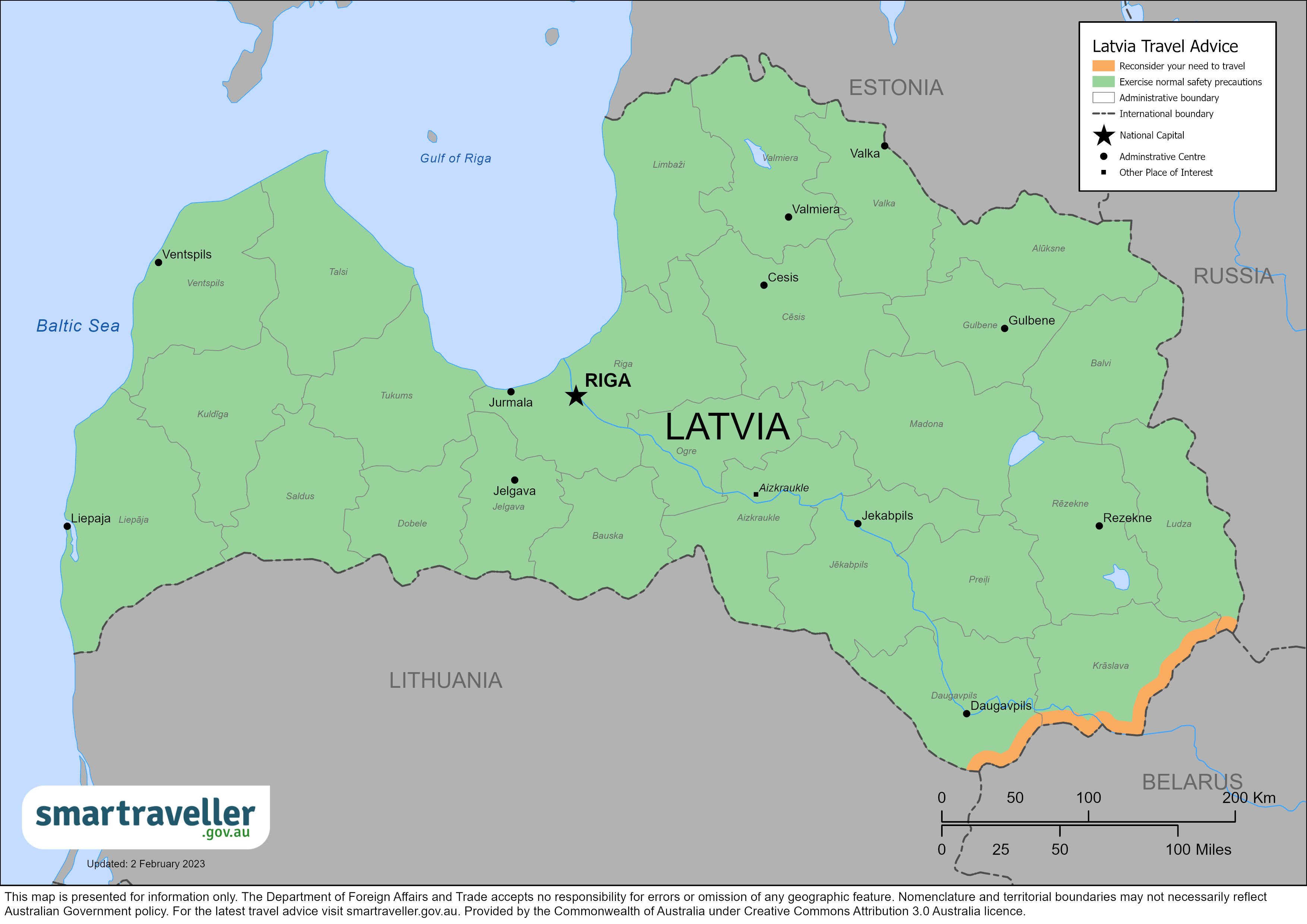
Latvia (PDF 225.75 KB)
Europe (PDF 2.62 MB)
Local emergency contacts
Fire and rescue services, medical emergencies.
Call 112 for social welfare emergencies, such as domestic violence or child abuse.
Advice levels
Exercise normal safety precautions in Latvia.
Reconsider your need to travel to areas near the border with Belarus.
Reconsider your need to travel to areas near the border with Belarus due to ongoing civil unrest.
The security environment at the Belarusian border could deteriorate at short notice. If you're in these areas, carry ID with you at all times and follow the advice of local authorities.
- Petty crime is common, particularly in Riga. This includes bag snatching, pickpocketing and muggings. Hotspots include Old Town, the central train and bus stations, the Central Market, parks, and routes to major hotels. Take care of your belongings.
- Check the price of drinks before ordering. Tourists are sometimes overcharged. Credit card fraud also occurs in shops, restaurants, bars and nightclubs. Watch your card during transactions. Don't sign blank credit card slips.
- Criminals may spike drinks in bars and casinos. Don't leave your drinks unattended.
Full travel advice: Safety
- Public medical facilities are good in larger cities but more limited in rural areas. Private facilities are of a similar standard to those in Australia. You may need to pay up-front.
- If you're seriously ill or injured, you may need medical evacuation. Ensure your travel insurance covers this.
Full travel advice: Health
- Don't use or carry illegal drugs. Penalties are severe, even for small amounts. They include jail terms and heavy fines.
- Don't drink alcohol in public except in designated areas. Authorities may fine you for carrying open beer or wine containers.
- Check with local officials before you export religious materials or antiques. There are restrictions on what you can export.
- Latvia recognises dual nationality. Contact the nearest Latvian embassy or consulate for details. Always travel on your Australian passport.
Full travel advice: Local laws
- Entry and exit conditions can change at short notice. You should contact the nearest embassy or consulate of Latvia for the latest details.
- Latvia is part of the Schengen area with many other European countries. See Smartraveller for information on visa and entry requirements.
- Selected land borders between Latvia and Russia/Belarus remain open for travel via car except for vehicles registered in Russia carrying Russian license plates. These vehicles will be refused entry into Latvia. Commercial bus routes are also available. There are no passenger rail options currently running between Russia/Belarus and Latvia. Australians seeking to cross will need to comply with Latvian border rules and requirements. Visit the Latvian Border Guard website before crossing for more information.
- Latvia has temporarily suspended visas for Russian citizens. This may extend to Russian citizens who are family members of Australian citizens.
Full travel advice: Travel
Local contacts
- The Consular Services Charter details what we can and can't do to help you overseas.
- The Australian Consulate in Riga provides limited consular help. It doesn't offer visa, passport or immigration services.
- Contact the Australian Embassy in Sweden for full consular services.
- To stay up to date with local information, follow the embassy’s social media accounts.
Full travel advice: Local contacts
Full advice
Petty crime.
Petty crime is common, particularly in Riga Old Town. This can include:
- bag snatching
- pickpocketing
Hotspots for pickpockets include:
- central train and bus stations
- Riga Central Market
- routes to major hotels
Pickpockets usually operate in groups.
Drink spiking
Criminals may spike drinks in bars and casinos.
To protect yourself from spiking:
- never accept food or drinks from strangers
- don't leave your food or drink unattended
Scams and fraud
Reports of tourists being overcharged for drinks at restaurants and tourist pubs have declined. However, check drink prices before you order.
Credit card scams occur in places popular with tourists, such as:
- restaurants
Always keep your card in sight. Don't sign blank credit card slips.
Internet crime also happens, including online dating and financial scams.
Road-based crime
Car theft is common, particularly in Riga.
To protect yourself:
- use secure and well-lit car parks
- don't leave valuables in a vehicle
Cyber security
You may be at risk of cyber-based threats during overseas travel to any country. Digital identity theft is a growing concern. Your devices and personal data can be compromised, especially if you're connecting to Wi-Fi, using or connecting to shared or public computers, or to Bluetooth.
Social media can also be risky in destinations where there are social or political tensions or laws that may seem unreasonable by Australian standards. Travellers have been arrested for things they have said on social media. Don't comment on local or political events on your social media.
More information:
- Cyber security when travelling overseas
Civil unrest and political tension
Border areas.
Demonstrations
Civil unrest is uncommon.
However, public protests and events that draw large groups of people can turn violent.
If you're in an area where protests have happened:
- monitor the media
- follow the advice of local authorities
More information:
Demonstrations and civil unrest
While there have been no recent terrorist attacks in Latvia, they can still happen.
There's an ongoing threat of terrorism in Europe. Terrorists have staged attacks in several European cities.
The Latvian State Security Service assesses Latvia's terrorist threat level as low.
Terrorism is a threat worldwide.
Climate and natural disasters
Severe weather.
Latvia experiences extremely cold winters and heavy snowfall. This can affect major metropolitan areas.
Severe weather can delay transport and temporarily shut down infrastructure.
Flooding may occur in spring, from March to May.
If there's a natural disaster or extreme weather:
- use common sense
- monitor the news and other local sources for up-to-date information
Register with the Global Disaster Alert and Coordination System to receive alerts on major disasters.
Travel Insurance
Get comprehensive travel insurance before you leave. Your policy needs to cover all overseas medical costs, including medical evacuation. The Australian Government won't pay for these costs. If you can't afford travel insurance, you can't afford to travel. This applies to everyone, no matter how healthy and fit you are.
If you're not insured, you may have to pay many thousands of dollars up-front for medical care.
- what activities and care your policy covers
- that your insurance covers you for the whole time you'll be away
Physical and mental health
Consider your physical and mental health before you travel, especially if you have an existing medical condition.
See your doctor or travel clinic to:
- have a basic health check-up
- ask if your travel plans may affect your health
- plan any vaccinations you need
Do this at least 8 weeks before you leave.
If you have immediate concerns for your welfare or the welfare of another Australian, call emergency services on 112, and for emergency consular assistance, call the 24-hour Consular Emergency Centre on +61 2 6261 3305 or contact your nearest Australian Embassy, High Commission or Consulate to discuss counselling hotlines and services available in your location.
- General health advice
- Healthy holiday tips (Healthdirect Australia)
Medications
Not all medications available over the counter or by prescription in Australia are available in other countries. Some may even be considered illegal or a controlled substance, even if prescribed by an Australian doctor.
If you plan to bring medication, check if it's legal in Latvia. Take enough legal medication for your trip.
Carry a copy of your prescription or a letter from your doctor stating:
- what the medication is
- your required dosage
- that it's for personal use
Health risks
Insect-borne illnesses.
Tick-borne encephalitis and other tick-borne diseases are a risk in forest areas.
Ticks are active from spring to autumn: March to November.
To protect yourself from disease:
- use insect repellent
- wear long, loose, light-coloured clothing
- check your body for ticks during and after forest visits
If a tick bites you:
- remove it from your body as soon as possible
- make sure you remove the whole tick
- monitor the site for signs of infection
- Tick bite prevention
Other health risks
- Hepatitis A
- Tuberculosis
Waterborne, foodborne, parasitic and other infectious diseases can also occur. Water contamination may be a problem in rural areas.
To protect yourself from illness:
- boil all drinking water or drink bottled water with intact seals
- avoid ice cubes
- avoid uncooked and undercooked food, such as salads
Seek medical advice if you suspect food poisoning or have a fever or diarrhoea.
Medical care
Medical facilities.
In large cities, the standard of public medical facilities is good. However, in rural areas, public medical facilities may be more limited.
Most private medical facilities are well-equipped. Services are of a similar standard to those in Australia.
You may need to pay doctors and hospitals up-front before they'll treat you.
If you become seriously ill or injured, you may need to evacuate to a place with better facilities. Medical evacuation can be very expensive.
You're subject to all local laws and penalties, including those that may appear harsh by Australian standards. Research local laws before travelling.
If you're arrested or jailed, the Australian Government will do what it can to help you under our Consular Services Charter . But we can't get you out of trouble or out of jail.
Penalties are severe for drug offences, including for possessing small amounts of drugs. Penalties may include long jail terms and heavy fines.
- Carrying or using drugs
- Partying safely
You can't drink alcohol in a public place unless it's in a designated area. Authorities often issue fines to people for walking with open beer or wine containers.
Authorities also strictly control the export of:
- religious materials
If you're in doubt, check with local authorities. Before you buy an item, ask authorities whether you're allowed to export it.
Australian laws
Some Australian criminal laws still apply when you're overseas. If you break these laws, you may face prosecution in Australia.
Staying within the law and respecting customs
Dual citizenship
Latvian authorities recognise dual nationality.
For information on dual citizenship or to check your status, contact the nearest embassy or consulate of Latvia .
Travel on your Australian passport at all times.
Dual nationals
Visas and border measures
Every country or territory decides who can enter or leave through its borders. For specific information about the evidence you'll need to enter a foreign destination, check with the nearest embassy, consulate or immigration department of the destination you're entering.
Latvia is part of the Schengen Area with many other European countries. This means you can enter Latvia without a visa in some cases.
In other situations, you'll need to get a visa.
When you first enter the Schengen Area, get an entry stamp in your passport from border control staff.
Entry and exit conditions can change at short notice. Contact the embassy of Latvia in Canberra for the latest details about visas, currency and customs.
For more information about visa requirements, refer to the Latvian Office of Citizenship and Migration Affairs .
Entry into Latvia
To enter Latvia, you must have a valid health insurance policy. Your cover must include any health-related expenses during your stay, including the cost of flying you home. If you don't have adequate insurance, authorities may ask you to buy a policy when you arrive.
- Latvian Ministry of Foreign Affairs
- Riga airport
- Office of Citizenship and Migration Affairs
Some countries won't let you enter unless your passport is valid for 6 months after you plan to leave that country. This can apply even if you're just transiting or stopping over.
Some foreign governments and airlines apply the rule inconsistently. Travellers can receive conflicting advice from different sources.
You can end up stranded if your passport is not valid for more than 6 months.
The Australian Government does not set these rules. Check your passport's expiry date before you travel. If you're not sure it'll be valid for long enough, consider getting a new passport .
Authorities may ask you to verify your identity while you're in Latvia. Always carry:
- your passport
- your Latvian residency permit, if you have one
Lost or stolen passport
Your passport is a valuable document. It's attractive to people who may try to use your identity to commit crimes.
Some people may try to trick you into giving them your passport. Always keep it in a safe place.
If your passport is lost or stolen, tell the Australian Government as soon as possible:
- In Australia, contact the Australian Passport Information Service .
- If you're overseas, contact the nearest Australian embassy or consulate .
Passport with 'X' gender identifier
Although Australian passports comply with international standards for sex and gender, we can't guarantee that a passport showing an 'X' in the sex field will be accepted for entry or transit by another country. Contact the nearest embassy, high commission or consulate of your destination before you arrive at the border to confirm if authorities will accept passports with 'X' gender markers.
More information:
- LGBTI travellers
The local currency is the Euro.
Latvia is a member of the European Union (EU). If you're travelling between Latvia and any non-EU country, you must declare amounts over 10,000 euros or equivalent. This covers all forms of currency, not only cash.
You'll have to pay a fine when you enter or leave Latvia if you:
- don't declare this money
- give incorrect information
You don't need to declare currency if you're travelling between EU countries.
Local travel
Select land borders between Latvia and Russia/Belarus remain open for those travelling by car, except for vehicles registered in Russia carrying Russian license plates. These vehicles will be refused entry into Latvia. The situation may change with little notice, including which crossing points remain open.
Commercial bus routes are available. No passenger rail options are currently running between Russia/Belarus and Latvia.
You must comply with Latvian border rules and requirements.
Expect increased wait time and delays at the border with Russia . Visit the Border Guard website for the latest information on border crossings.
More information
- Latvian Border Guard website
- State Revenue Service of Latvia
International Driving Permit
If you plan to drive in Latvia, you are required to obtain an International Driving Permit (IDP). Get your IDP before you leave Australia.
Road travel
Driving can be dangerous. Hazards include:
- icy roads and low visibility in winter
- poorly maintained roads and vehicles
- dimly lit roads
You're more likely to die in a motor vehicle accident in Latvia than in Australia.
Learn the local road rules, including:
- always drive with headlights on
- fit winter tyres from around 1 December to 1 March (dates vary with weather conditions)
If you've been driving for less than 2 years, the blood alcohol limit is 0.02%. For everyone else, the limit is 0.05%.
Penalties for driving over the limit can include:
- a heavy fine
- a jail sentence
- losing your licence
- losing your vehicle permanently
- Driving or riding
Public transport
Public transport, including buses and trains, is generally reliable and safe.
Use official, well-marked taxis. These display yellow license plates.
- Transport and getting around safely
DFAT doesn't provide information on the safety of individual commercial airlines or flight paths.
Check Latvia's air safety profile with the Aviation Safety Network.
Emergencies
Depending on what you need, contact your:
- family and friends
- travel agent
- insurance provider
English-speaking operators are available.
The Riga tourist police unit has a 24-hour hotline in English. To report a crime, call 2 203 3000 or 67 181818.
Always get a police report when you report a crime.
Your insurer should have a 24-hour emergency number.
Consular contacts
Read the Consular Services Charter for what the Australian Government can and can't do to help you overseas.
Australia has a Consulate in Latvia headed by an Honorary Consul. The Consulate provides limited consular assistance. It does not provide visa and immigration services or passports. For full consular services, contact the Australian Embassy in Stockholm, Sweden.
Australian Consulate, Riga
Teikums Teodors Gustava Zemgala Gatve 74 Riga LV-1039 LATVIA Telephone: +371 29 509100 Email: [email protected]
Australian Embassy, Stockholm
Klarabergsviadukten 63, 8th Floor 111 64 Stockholm, Sweden Phone: +46 0 8 613 2900 Email: [email protected] Website: sweden.embassy.gov.au Facebook: Australian Embassy, Sweden
X (Twitter): @AusAmbSE
Check the Embassy website for details about opening hours and any temporary closures.
24-hour Consular Emergency Centre
In a consular emergency, if you can't contact an embassy, call the 24-hour Consular Emergency Centre on:
- +61 2 6261 3305 from overseas
- 1300 555 135 in Australia

Travelling to Latvia?
Sign up to get the latest travel advice updates..
Be the first to know official government advice when travelling.
Cookies on GOV.UK
We use some essential cookies to make this website work.
We’d like to set additional cookies to understand how you use GOV.UK, remember your settings and improve government services.
We also use cookies set by other sites to help us deliver content from their services.
You have accepted additional cookies. You can change your cookie settings at any time.
You have rejected additional cookies. You can change your cookie settings at any time.
- Passports, travel and living abroad
- Travel abroad
- Foreign travel advice
Warnings and insurance
The Foreign, Commonwealth & Development Office ( FCDO ) provides advice about risks of travel to help British nationals make informed decisions. Find out more about FCDO travel advice .
Before you travel
No travel can be guaranteed safe. Read all the advice in this guide as well as support for British nationals abroad which includes:
- advice on preparing for travel abroad and reducing risks
- information for women, LGBT+ and disabled travellers
Follow and contact FCDO travel on Twitter , Facebook and Instagram . You can also sign up to get email notifications when this advice is updated.
Travel insurance
If you choose to travel, research your destinations and get appropriate travel insurance . Insurance should cover your itinerary, planned activities and expenses in an emergency.
Related content
Is this page useful.
- Yes this page is useful
- No this page is not useful
Help us improve GOV.UK
Don’t include personal or financial information like your National Insurance number or credit card details.
To help us improve GOV.UK, we’d like to know more about your visit today. We’ll send you a link to a feedback form. It will take only 2 minutes to fill in. Don’t worry we won’t send you spam or share your email address with anyone.
What are the latest Latvia travel requirements?

April 18, 2021 • 1 min read
TRAVEL REQUIREMENTS

Here's the latest travel information for visiting Latvia. This update includes the latest information from government agencies, including the US Embassies, and addresses if travel is allowed, if quarantine is required, if testing is required, and if vaccines are required.
Can you currently travel to Latvia?
To keep this post as current as possible, see below chart for the latest information. You can also check the last updated date as well, and a link to the source for further reference.
How else can I find out about Latvia travel requirements?
As the global travel situation continues to evolve, information can change on a daily or weekly basis. Specifically for Latvia, we recommend checking with the US Embassy in Latvia on entry and exit requirements, especially for returning to the US. A link to the most up-to-date source for Latvia travel is in the above chart.
What else should I know about the latest travel requirements to Latvia?
While checking requirements related to quarantine, testing, and vaccinations, don't forget to check your other documents, such as ensuring your passport is valid for at least another 6 months. We typically suggest you try to have at least a year of validity on your passport, given passport renewal times, and most countries require at least 6 months to enter. You can get help with your passport renewal with our door-to-door passport renewal service .
In addition, if you're not enrolled in TSA PreCheck, it's the best way to skip the security line at US airports while keeping your bags packed and shoes on. You can pre-enroll on our Skip app, available in the App Store or Google Play . The app also gives you reminders and alerts about expiring documents and travel changes.
travel requirements
Download the .css-7gc50t{color:var(--chakra-colors-primary-500);font-weight:inherit;} Skip App
Download on the
Google Play
- Skip Grants
- Skip For Good
- Plus Memberships
- One-on-One Memberships
- Our Partners
- Member Success Stories
- Partner With Us
- Become an Affiliate
- How to Get Small Business Funding
- See the Latest Grant Options
- Search For Business Funding
- What's the Skip App
- Submit a Grant
- Help Center
We Help Entrepreneurs Go Further
Copyright © 2024 , YoGovernment, Inc.
- Privacy & Policy
- About Latvia Facts about Latvia Practical information Brochures and maps Top 10 attractions
- Experience Regions Active holiday Architecture Culture Cities Events Nature Wellness For families with kids
- Discover Riga
- Eat&drink
- Where to stay
- Trip planner
Search in Latvia
Choose your language, explore latvia.

Top 10 attractions in Latvia

Reasons to spend holidays in Latvia

Discover Latvia and gain an unforge...

Stay at castles and manors

Architectural diversity in Latvia

Best nature parks in Latvia

Attractions for families travelling...

Bathing traditions in Latvia

For coffee lovers
Upcoming events.

Latvia vs Finland. Test game in hoc...

The Jungle Book. Reimagined.

Elvi Floorball League Superfinals

Fashion. Design. Spring

Operetta Theatre 10th Anniversary G...
#latvia on instagram.

U.S. Citizens Will Need to Register and Pay a Fee to Enter Europe in 2024—Here’s What to Know
E ach year, American tourists flock to Europe to glimpse the Eiffel Tower, Big Ben, the Sistine Chapel and thousands of other must-see attractions. With so many landmarks to explore in Western Europe and beyond, it's no surprise the continent is a top destination for U.S. citizens. According to the consumer research company Statista, more than 10 million Americans made the trek to France , Italy , Spain and Germany in 2019 alone. But if you want to travel there after January 2024, you'll have to register and pay a fee. It's all thanks to the newly launched European Travel Information and Authorization System (ETIAS).
The European Union's new system will add an extra step to your travel requirements for 30 European countries. But though it sounds complicated, the process won't be difficult. And we've got everything you need to know before you book your next European vacay.
Get Reader’s Digest ’s Read Up newsletter for more travel, humor, cleaning, tech and fun facts all week long.
What is ETIAS?
There's no such thing as an ETIAS visa, and the system isn't a digital nomad visa either. So what is it, then? According to the official website, ETIAS is the "new travel permit for Americans and other visa-exempt non-EU citizens visiting European destinations." It's an electronic travel authorization for visa-free countries, and it has a faster application and processing time than a visa.
In other words, U.S. citizens won't need a visa to continue traveling to Europe—but they must apply for ETIAS.
If you meet the ETIAS requirements, you won't need a visa if you're traveling for up to 90 days in any 180-day period for business, short-term study or tourism. If you currently hold a passport or will soon apply for a passport from one of 59 travel-visa-free countries and are between the ages of 18 and 70, you will need the new travel authorization for European travel within the Schengen area (a travel zone made up of 27 European countries).
Why are these European requirements changing?
The European Union is changing its requirements to include ETIAS to benefit both travelers and the European Union. When traveling overseas to Europe using ETIAS, you'll benefit from a more streamlined border crossing—the new travel authorization will get you through faster.
But the launch of the electronic authorization system aims to keep the European Union safer too. Better border management means officials can keep an eye on security issues at the borders. And because ETIAS links to security databases, it'll be easier to fight terrorism and criminal activity.
When will ETIAS go into effect?
The current launch date for ETIAS in Europe is sometime in January 2024. But that comes after some delays. The European Union initially intended ETIAS to go into effect in January 2021 but later postponed the kickoff to 2023. The quiet pushback of the launch date, following a series of hiccups, has led up to its slated release in 2024, but some sources note that it may take a while for it to go into effect.
Per the ETIAS website, "after the initial launch, there may be a short period of three to six months where ETIAS may not be mandatory for travel. This is to allow the EU to work through any system issues, which may negatively impact travelers due to complications with the initial rollout." Additionally, the site notes that this is "barring any delay in implementation," so it's unclear whether the 2024 launch date is set in stone.
Still, if you're planning a romantic European vacation and want to skip the new system, you'll have to travel soon.
What countries will require authorization?
Gearing up for some European country-hopping ? These 23 European countries in the Schengen area will require ETIAS authorization from American travelers:
- Czech Republic
- Netherlands
You will also need ETIAS for four non-EU member states:
- Liechtenstein
- Switzerland
Additionally, these non-Schengen EU states will require ETIAS:
Finally, these microstates will also require the new travel authorization:
- Vatican City
What's the difference between ETIAS and EES?
The European Union is launching not only ETIAS but also a border-management strategy called the Entry/Exist System (EES). The first thing to know: ETIAS and EES are not the same thing.
For starters, ETIAS is a new entry requirement, while EES is a registration. When traveling visa free, you'll need to apply for ETIAS travel authorization, but you won't need to take any action before your trip for EES registration. Instead, this is done automatically at the external border of any of the 29 European countries using EES, and this registration will take place each time you cross an external border between countries. EES will also replace manual passport stamps.
How much does ETIAS cost?
Luckily, if you're traveling on a budget , the application fee for ETIAS won't break the bank—it's less than $10. Travelers will pay $8 for ETIAS (or €7).
How do you apply for ETIAS?
Applying for ETIAS online is a relatively simple process. You'll fill out the electronic form with personal information, such as your first and last name, nationality, place of birth, address, phone number and email. You'll also need to include your passport information , your travel plans and your history of travel, and you'll have to answer security-based questions. From there, you'll pay the fee and submit your application.
It's important to avoid scam websites pretending to be ETIAS. Make sure you apply on the official site using this application .
Overall, the application process should take about 10 minutes, while approval for your travel authorization will take 96 hours or fewer. You'll know your application has been approved when you receive an official confirmation email.
How long does an ETIAS authorization last?
Once you've received your ETIAS authorization, it will remain valid for three years from the issue date. You may use it to travel multiple times as long as your travel documents have not expired.
How often do you need to renew/reapply?
You will need to reapply for ETIAS when your previous travel permit has expired, which will happen three years after your application date. If your passport expires sooner, you will need to get a new passport and reapply for ETIAS.
- Statista : "The Most Popular Destinations for U.S. Travelers Abroad"
- European Travel Information and Authorisation System : "Europe's Travel Authorization for U.S. Citizens"
- European Travel Information and Authorisation System : "ETIAS start date set for 2024"
- European Travel Information and Authorisation System : "ETIAS Requirements"
- European Travel Information and Authorisation System : "What are the ETIAS benefits to the European Union?"
- ETIAS : "ETIAS Requirements"
- ETIAS : "Frequently Asked Questions"
- European Union : "Key differences between ETIAS and the EES"
The post U.S. Citizens Will Need to Register and Pay a Fee to Enter Europe in 2024—Here’s What to Know appeared first on Reader's Digest .
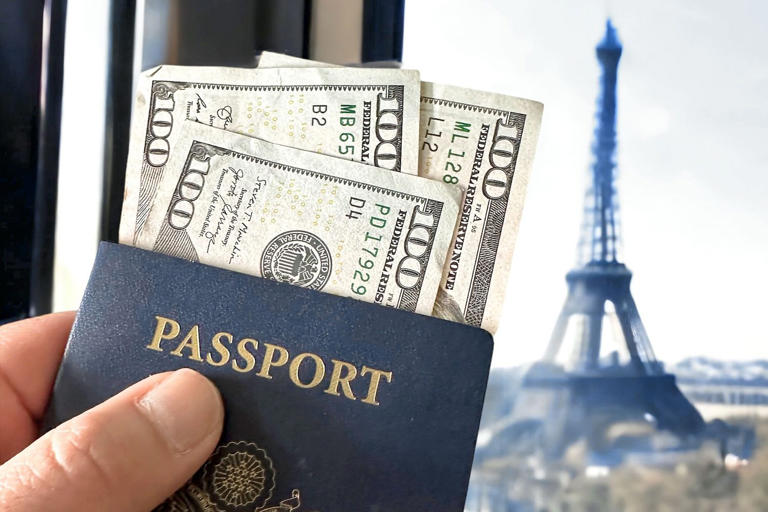
The Federal Register
The daily journal of the united states government, request access.
Due to aggressive automated scraping of FederalRegister.gov and eCFR.gov, programmatic access to these sites is limited to access to our extensive developer APIs.
If you are human user receiving this message, we can add your IP address to a set of IPs that can access FederalRegister.gov & eCFR.gov; complete the CAPTCHA (bot test) below and click "Request Access". This process will be necessary for each IP address you wish to access the site from, requests are valid for approximately one quarter (three months) after which the process may need to be repeated.
An official website of the United States government.
If you want to request a wider IP range, first request access for your current IP, and then use the "Site Feedback" button found in the lower left-hand side to make the request.

IMAGES
VIDEO
COMMENTS
Reissued with obsolete COVID-19 page links removed. Exercise normal precautions in Latvia. Read the country information page for additional information on travel to Latvia.. If you decide to travel to Latvia: Enroll in the Smart Traveler Enrollment Program to receive travel alerts and make it easier to locate you in an emergency.; Follow the Department of State on Facebook and Twitter.
COVID-19 travel restrictions were lifted in Latvia. There is no need to present a certificate of vaccination, recovery from COVID-19 or negative test results. Facemasks and respirators must be worn in health care and social care facilities. It is still advisable to practice good hand and cough hygiene and do not travel if having any symptoms.
Only essential travelers, non-vaccinated, non-recovered from COVID-19, may enter Latvia. Complete list of categories of those who are allowed to enter Latvia is listed under Paragraph 38. 48 of the June 9, 2020 Cabinet of Ministers Regulation No.360 Epidemiological Safety Measures for the Containment of the Spread of COVID-19 Infection . All persons travelling to Latvia must fill out an ...
Last update 15.06.2021. From Wednesday, June 16, the ban on non-essential travel, the requirement to pass the Covid-19 test and self-isolate when entering Latvia will be lifted if an individual can present a digital Covid-19 certificate confirming the completion of vaccination or recovery from the disease. Today, June 15, the government ...
Latvia entry details and exceptions. All travelers that use international flights to and from China are recommended to wear medical masks or FFP2/N95/KN95. Latvia has closed its borders to Russians entering for tourism purposes. This page covers COVID-19 related travel restrictions only. For other travel restrictions, please check the guidance ...
To enter Latvia (and all Schengen countries) your passport must: have a 'date of issue' less than 10 years before the date you arrive. Passports issued after 1 October 2018 are now valid for ...
In accordance with the Cabinet of Ministers Regulation No. 662 "Epidemiological Safety Measures for the Containment of the Spread of Covid-19 Infection", entry into Latvia from abroad has been facilitated for persons vaccinated against Covid-19, as well as persons who have contracted the disease, upon presentation of a valid digital Covid-19 certificate from most countries, except ...
Published: 16.06.2021. From Wednesday, June 16, the ban on non-essential travel, the requirement to pass the Covid-19 test and self-isolate when entering Latvia will be lifted if an individual can present a digital Covid-19 certificate confirming the completion of vaccination or recovery from the disease. Today, June 15, the government approved ...
Given that travel is not currently important in promoting the spread of Covid-19, the rules for entering Latvia will also change. For now, the current requirements to present an interoperable Covid-19 certificate or a negative Covid-19 test result remain in force on entry from third countries.
COVID-19 travel restrictions were lifted in Latvia. Travellers are not required to provide proof of vaccination, recovery from COVID-19 or a negative test result. Learn more: Tourist Portal _____ You can find the latest information on air travel regulations for this country on the IATA website.
Latest FCDO travel advice for Latvia including on entry requirements, safety and security and local laws and customs.
Latvia in UNESCO; Latvia in the UN system bodies; Candidatures of Latvia and its Representatives for the UN system bodies Broader representation in the international organizations is a prerequisite for the implementation of interests of Latvia's foreign policy. Latvia's candidacy to the United Nations Security Council (2026-2027)
Entry requirements vary depending on the type of passport you use for travel. Before you travel, check with your transportation company about passport requirements. Its rules on passport validity may be more stringent than the country's entry rules. ... If you decide to travel to Latvia during these periods: be prepared to change your travel ...
For detailed requirements and a comprehensive list of persons exempt from the test, see Paragraph 159 of the Cabinet of Ministers Regulation, "Epidemiological Safety Measures for the Containment of the Spread of COVID-19 Infection". ***Upon entering Latvia individuals shall, 10 days after leaving the United States, ensure self-isolation.
Tourists travel to Latvia on a Schengen visa, which is valid for staying in Latvia as well as in the other Schengen Area member states. Passport control on the border is only done once the person crosses into the Schengen Area. If the person has been issued a visa for a short-stay visit to a Schengen country, the maximum duration of the ...
Holders of the following types of UK travel documents are required to apply for a Schengen visa in order to travel to Latvia: A stateless persons travel document, being red coloured (Convention of 28 September 1954); A certificate of travel, also called a certificate of identity, being either brown or black coloured. LTD visa; A convention ...
If your travel plans in Latvia include outdoor activities, take these steps to stay safe and healthy during your trip. Stay alert to changing weather conditions and adjust your plans if conditions become unsafe. Prepare for activities by wearing the right clothes and packing protective items, such as bug spray, sunscreen, and a basic first aid kit.
Latvia is part of the Schengen area with many other European countries. See Smartraveller for information on visa and entry requirements. Selected land borders between Latvia and Russia/Belarus remain open for travel via car except for vehicles registered in Russia carrying Russian license plates. These vehicles will be refused entry into Latvia.
Still current at: 7 April 2024 Updated: 8 March 2024 Latest update: Information on entry to Latvia for British-Russian dual nationals and driving in Latvia ('Entry requirements' and 'Safety ...
Here's the latest travel information for visiting Latvia. This update includesthe latest information from government agencies, including the US Embassies, andaddresses if travel is allowed, if quarantine is required, if testing isrequired, and if vaccines are required.Can you currently travel to Latvia? To keep this post as current as possible, see below chart for the latestinformation. You ...
Your travel insurance should follow the Schengen requirements since Latvia is a Schengen country: The health insurance should cover at least €30,000 in case of medical emergencies. The health insurance must be valid in every country in the Schengen Area.
Latvia is called Europe's hidden culinary gem, according to the article published in the famous Jamie Oliver's blog. Country's cuisine has all the qualities valued highly in the Northern Europe.
The European Union's new system will add an extra step to your travel requirements for 30 European countries. But though it sounds complicated, the process won't be difficult.
The transit health certificate will be the same as if your pet's final destination was the EU country. Use the information and steps above under "Travel Requirements Based on Pet Type" to determine which health certificate should be used. View a list of EU countries. Considerations for airline travel:
Modify reporting requirements to require IPFs to submit patient-level data on a quarterly basis. We also refer readers to our RFI in which we solicit comments to inform elements to be included in the IPF patient assessment instrument, which the CAA, 2023 requires the Centers for Medicare & Medicaid Services (CMS) to develop and implement for ...